#It’s not a justification but it is critics to understanding why these ideals hold so much public support
Text
.
#I also think goyim especially European goyim SHOULD uniformally support the liberation of Palestine#And should also shut up about the quote origins of the Jews or their evils or whatever#Everyone sit down and think for a minute#Like please shuttttt up about how nice and cozy it was for us when until the big bad zionists came along#The biggest thing imho to think about with why Zionist ideology spread and gained popularity was as#Response to centuries of violence and discriminations and hen actual genocide and expulsion#It’s not a justification but it is critics to understanding why these ideals hold so much public support#there is no way to refute Zionism as it currently exists and rebuild our communities without recognising the harms and violence upon which#It initially gained credence and still does#I think you should think of what you ask anti Zionist Jews to do which is utterly refute the concept of a nation#And ask if you are doing that to yourselves#Or only supporting jewish people when they’re not only properly diasporist but also properly Tunisian or Greek or polish or whatever#Tied to your nations in a way you feel comfortable with#Just thoughts <a
13 notes
·
View notes
Text
The Unforgivable One
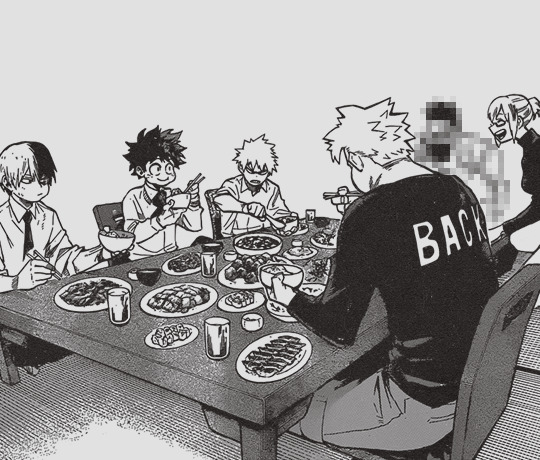
Someone in my inbox accused me of not treating the heroes like “flawed human beings”. However I think they had a fundamentaly misunderstanding of the way I read characters, both heroes and villains. I don’t see people as good or bad. I see everyone as equally human and flawed. Bad people don’t do bad things because they’re psychopaths, they often do these things for very understandable and human reasons. You can often hurt someone for very normal reasons. Abusers are in fact human too, and often they don’t really see themselves as bad people. Most people are not in fact cackling villains but in fact perfectly normal human beings going through mental gymnastics to justify themselves. So with that in mind let’s take a look at the incredibly flawed human being that is Todoroki Enji. Obvious content warning for discussion of child abuse under the readmore. If you can’t stomach it please don’t read this post for your own safety.
1. Endeavor’s Motivations

Endeavor’s motivations aren’t hard to understand, because they’re basically the same as Bakugo’s his foil. This is something the manga itself has commented upon. Bakugo gives us a view into the mindset of teen Endeavor and likely the attitude that led him to becoming the adult he is.
Endeavor is, in a way, as much of a victim of hero society as Bakugo is. In the fact that Enji has been negatively influenced by a lot of the views of hero society. Bakugo and Endeavor both have incredibly flashy quirks more suited to combat and defeating villains rather than saving people which makes them the ideal of hero society’s quirk prejudgice. People are not born equal, that’s the words that the manga start with, and it’s imporatnt to notice that people like Bakugo and Endeavor are heavily favored by hero society but that too comes with its own unique set of pressures. As hero society is ultimately a very toxic system overall that holds up an unhealthy ideal.
Bakugo is a bully, ultimately. He wants to make other people feel small to make himself feel big. Endeavor is the grown up version of that same bully. However, Bakugo while being a bully Bakugo also has an extremely uhealthy mindset where he is constantly piling up pressure on himself and never really feeling satisfied. A mindset which instead of trying to correct Hero society praises Bakugo for having, and encourages.
Let me explain. Basically, Bakugo and Endeavor are both the living embodiment of “damned by faint praise.” They are constantly being praised and told how special they are because of their quirks. However, while this may have been enough for them early on in their lives while they are little kids they eventually get the sense that they haven’t really earned the massive amounts of praise people give them.
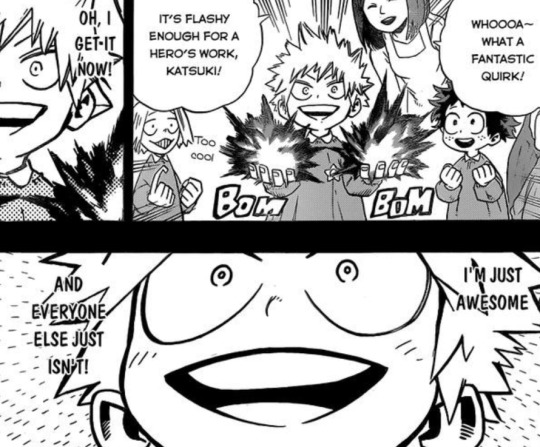
This causes both of them to be struck with a serious case of what most people call “Imposter’s Syndrome”, they don’t really feel like they’re the ones getting praised. They don’t feel like they’ve earned it. This is when one of their first mental traps springs. They decide they have to become the really great person that everyone sees them as. They’re always specifically aware of how short they fall as a hero from the expectations of everyone around them, and they are constantly working to make the difference up.
Endeavor and Bakugo are people who have incredible drive, and also an incredible motivation to improve themselves. This has been stated before by the story several times but none of these are bad traits to have. Wanting to improve yourself. Wanting to live up to everyone’s expectations of you, or even your own expectations of yourself can lead to you pushing yourself to do good things.
However, the problem is for both Bakugo and Endeavor that no matter how much they build themselves up in their head they’re building on very flimsy foundations. Both of them are building towers of sand, or houses of cards. They have a lot of self-confidence in themselves but it’s always fragile. Because they have confidence, but no security in themselves. They are extremely insecure individuals.
They both pile up an incredible amounts of stress and pressure on themselves to be the best, or at least to be as good as they think they should be, but they also both suffer from the two same critical flaws. Number one, they have been taught no healthy ways to deal with this negative buildup of stress. This is once again one of the faults of hero society, if people are strong then nobody around them will ever see them as week.
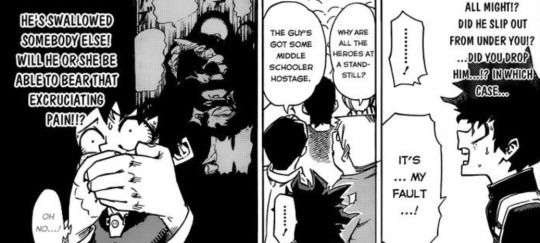
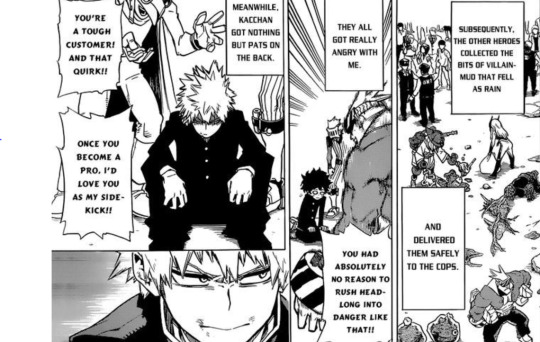
Bakugo is kidnapped by a villain at the start of the manga, not a single person is worried that he might be traumatized from nearly being killed. Of course not he has an incredibly powerful quirk. He’s strong, so he must not suffer from trauma like the weak kids.

Bakugo is uniquely pressured because he has a strong quirk, everyone around him expects him to be strong at all times and Bakugo himself does not allow himself to show any vulnerability. Bakugo legitimately believes that if he was strong enough, he would never fail, never lose. Bakugo basically doesn’t allow himself to be human in any of the ways that count. Bakugo only sees himself but that’s a double edged sword, when things go wrong the fault has to be with Bakugo, it’s because Bakugo was weak. So, Bakugo has been severely emotionally neglected by the institutions around him including UA, which after Bakugo has been kidnapped by several murderous villains did not think to check if a fifteen year old was traumatized and mentally healthy enough to return to classes.
The second flaw in their mindset is that they are continually forced to prove themselves. They work hard, but feel no satisfaction no matter what they accomplish. Even if they have the most resolved cases, even if they get number one in the tournament. This is because once again, the enormous pressure and expectations they push onto themselves. If a Straight A student gets A’s, it’s not extraordinary he’s merely doing what’s expected. If a C student gets an A that’s an accomplishment. Their expectations are so high for themselves that they can literally never be met, and therefore they feel no relief from the constant piling up of expectations and stress.

This is why Bakugo is fundamentally insecure. He’s not good enough to meet his own standards, and it seems like everyone else exists to prove how small he is. Bakugo sees the world as everyone else looking down on him because he’s so stuck in his own head. Bakugo cannot emotionally process this, and because of that at even the smallest upset he starts crying and acting like a child because he just can’t handle these emotions. He’s unstable, mentally always in a very precarious place.
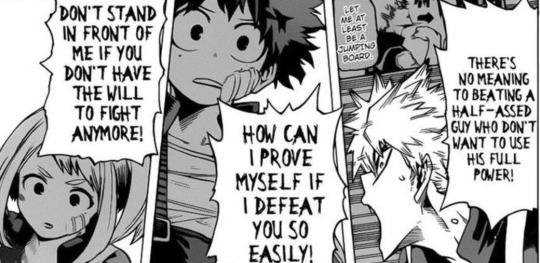
What Bakugo wants is to feel good about himself. He wants to feel like all his hard work is accomplishing something. However, Bakugo’s self esteem comes not from what he’s accomplished but rather that feeling of being better than others, the societal pressure to be the best, which is why he not only has to be the strongest but has to put others down below him. Not only that, but if he feels like somebody is disrespecting him or not taking him seriously then Bakugo even goes as far as to lash out violently. He literally tried to attack an unconscious Todoroki (who was holding back due ot having flashbacks of his father in the middle of a fight against Bakugo... hmm, i wonder why). Bakugo’s mindset is very insular. Bakugo just kind of assumes that everybody thinks exactly the same way he does, because he’s not emotionally intelligent really to understand other people. So he just assumes Todoroki holding back is an intentional insult against him and gets angry. In Bakugo’s mind it’s justifable to be violent against an unconscious Todoroki, because Todoroki’s the one intentionally provoking him and looking down on him.

Bakugo and Endeavor go through a similiar arc. They both build these giant towers on foundations of sand, only to watch them crumble and be left with nothing. They both realize that they were fighting for the wrong thing all this time.
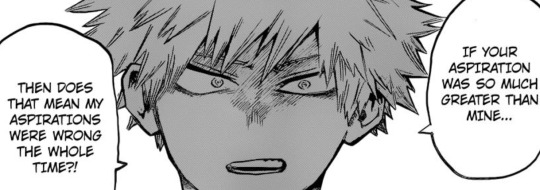
When they realize they were fighting for the wrong thing, all they can feel is emptiness and their own personal disatisfaction. Bakugo and Endeavor were chasing something they were never really going to have in the first place, because even if they became the number one hero, even if they were the strongest in the world it would never be enough for them. Which means they’ve accumulated all this stress but have no healthy way to deal with it so they vent it out. Literally the only thing Bakugo can think of to do when he’s at his limit is beat up Deku one more time and try to make himself feel strong again and prove that his way of doing things wasn’t wrong.
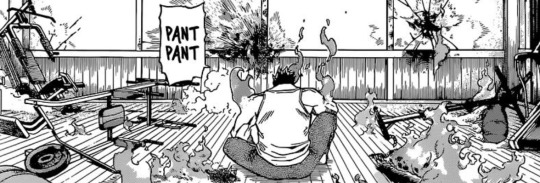
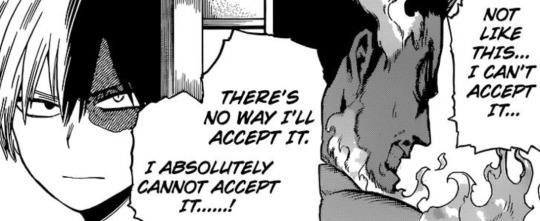
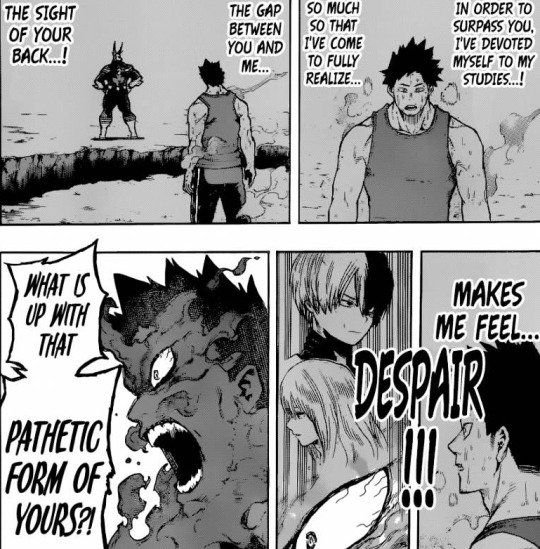
Bakugo and Endeavor find themselves at similiar points. They both realize everything they were devoting themselves for was wrong from the start, and they were never going to get what they wanted out of life. While Endeavor’s reasons are not necessarily sympathetic, they are at least understandable and human. Endeavor feels like he’s owed a reward for all of his hard work. He wants to feel like he’s someone special and important. Endeavor and Bakugo are selfish yes, but a selfish drive doesn’t have to be a bad thing necessarily. Endeavor and Bakugo are always pushing themselves to be the absolute best version of themselves because they believe in society’s pressure to be the best wholeheartedly. They’re also continually made to feel worse than everyone around them. Their tremendous egos are actually fueld by very small insecurities.
They also much like human beings don’t absolutely think they are right all the time. Bakugo and Endeavor both have hit their limits so to speak. Their struggles are sisyphian. They push the boulder up the hill, watch it roll down, push the boulder up the hill, watch it roll down and are slowly realizing that all of their struggles are getting them absolutely nowhere. At which point both of them begin to self reflect and think they may have been going about things all wrong from the start. Bakugo and Endeavor both have some awareness of how unhealthy their mindset is, or at least that it’s not getting them what they want. They are sometimes capable of questioning themselves and where they’ve gone wrong.
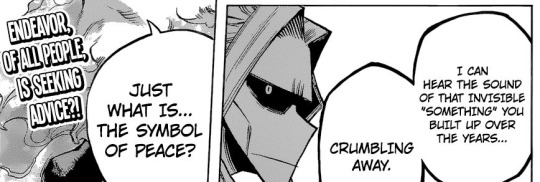
2. A Show Parent
Psychological projection is a defense mechanism people subconsciously employ in order to cope with difficult feelings or emotions. Psychological projection involves projecting undesirable feelings or emotions onto someone else, rather than admitting to or dealing with the unwanted feelings.

Endeavor is constantly battling with his own feelings of inferiority in weakness. However rather than process these feelings in healthy ways, Endeavor has always chosen to take his feelings out on his family. The reason why is because from the start Endeavor has viewed his family in a selfish way, they existed, and continue to exist for him and not the other way around.
The way Enji projects on his family is actually for pretty common every day reasons. Enji himself feels like he can’t achieve what he wanted out of life. He wasn’t good enough to become number one, he couldn’t hack it and therefore he’ll never be good enough. That’s why he made the decision to instead try to live vicariously through Shoto, who he sees as an extension of himself. Enji has projected all of his wants and desires entirely onto Shoto. When he was raising Shoto, it was never about having Shoto’s needs met, but rather what Enji’s wants were.


Enji feels that he himself is not good enough so he projects himself onto Shoto to accomplish what he can’t, belcause he thinks he will be able to find the fulfillment he’s seeking that way. It’s the same as a person with dreams of becoming an actor pushing their child onto the stage at young ages instead of letting them go to school with all of the other kids. It’s the same as a person who wasn’t able to achieve their dreams in sports pushing their kid to be good at sports. In that sense Enji is not Todoroki’s father, he is his coach, or his manager. He’s not responsible for taking care of a child he’s raising them for a purpose.

This is the reason why we see Enji get physically angry at Shoto. Enji has so thoroughly projected himself onto Shoto, that anything Shoto wants outside of what Enji wants, Enji perceives as resistance. Enji does not seem to get that a five year old can’t take the intensive training because he sees himself as that five year old. He thinks that Shoto must just not want it enough. That he’s not motivated enough. That he’s resisting him purposefully. It’s the same reason as Bakugo getting violent towards the unconscious Shoto near the end, when Shoto stopped fighting him seriously Bakugo in his fragility perceived it as Shoto holding back from him on purpose because he was looking down on him.

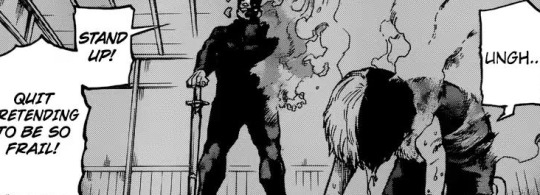
If Shoto succeeds then Enji expects to feel that success. If Shoto fails that means Enji is not only reminded of his own inferiority again, but he also is forced to relive his lost dreams. Shoto doesn’t know any of that though, he’s just Shoto, just a kid, so of course he’s going to fall short of Enji’s extremely schewed expectations which is where the negative feedback loop beings.
Because, even though Enji is using his family to try to make himself feel better that doesn’t work either. The truth is Enji can’t live vicariously through his son. Shoto’s success is not his success, and Shoto himself even wants nothing to do with him anymore. Enji has been using his family for completely selfish reasons up to this point and we reach a point in the narrative where Enji at least seems to grasp the fallout of his actions. Enji is at least aware of the fact that his family doesn’t like him, and that he’s done a bad.

Reconciliation and calm are both stages that are written into the cycle of abuse for a reason. Most abusers are not heartless monsters, but rather humans. The frightening thing is abuse is a very normal thing, that arises from normal circumstances. Almost anybody can become an abuser, because it’s an abuse of power, it’s a cycle people get trapped in. A lot of abusers realize that what they are doing is wrong, this is called th reconciliation stage of abuse. Most people do in fact feel bad about it when they hurt another person and want to make ammends.
The reason abuse repeats however is because the core behavior does not change, and the power dynamic remains in place. Abusers apologize for the wounds they caused, but don’t really address the problems of their behavior on a deeper level, and because of that they let the tensions build again and another incident always occurs.
So what we are seeing post All Might retirement is not really a change in Enji’s behavior, because the core of who he is remains the same. He has perhaps had a change in motivation, he’s realized that trying to be the number one hero is never going to get him what he wants, and the way he’s treated his family has made his family hate him. However, he never addresses the core of the issue which is that he thinks his family exists for his sake. This is not my analysis these are things Enji has literally said, not in the tournament arc but post Kamino. Endeavor still says I’m going to leave everything to Shoto. Not even asking what Shoto wants to be. He still sees Shoto as his heir who exists to carry on his legacy.
Enji is still essentially doing exactly what he did before and expecting a different result. He even says so to Shoto, if he’s a good enough hero, then Shoto will watch him, and be proud of him. These are Endeavor’s own selfish motivaions and not what the other people around him really want him to do. He’s doing this for the acknowledgement he thinks he deserves, and the attention from his family he thinks he deserves and not really for altruisitic or heroic reasons.
Enji repeats a lot of his behavior from before. He still piles attention and attention onto Shoto that Shoto does not want. He is still essentially projecting himself onto Shoto and the rest of his family, that behavior has not changed, it’s just his method. He thinks if he becomes number one dad now instead of number one hero that will get him the sense of accomplishment he craves. The problem is underneath all of his actions, Enji has yet to really grasp what he did wrong. He doesn’t grasp how selfish his actions are. He doesn’t seem to understand how messed up it is, that he seems to think his family exists for his sake. He found a wife, he had children, he had Shoto, not because he wanted to make a family happy but because he wanted to use them to further his own amibtions to become a hero.
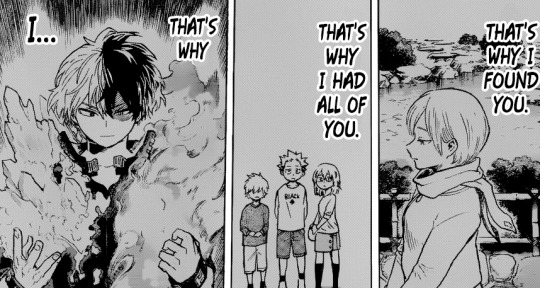
Enji is both capable of realizing that he hurt people, and feeling genuine remorse fo his actions but also not really making any signficant changes for his behavior. The fact that both of these can be true simultaneously is what allows abuse to continue.
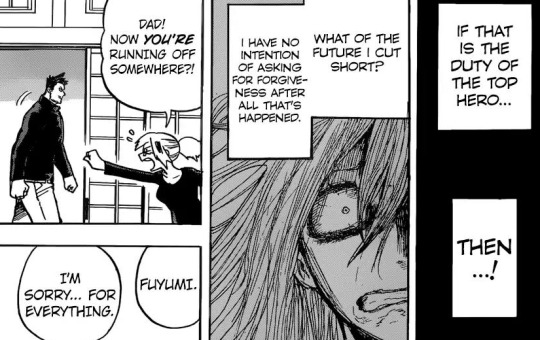
While he knows he did something wrong you also get a sense he doesn’t truly understand how truly heinous some of his actions were. Enji always has this narrative inside of his head that he simply made a mistake somewhere along the way, that he acted without even realizing what he was doing.
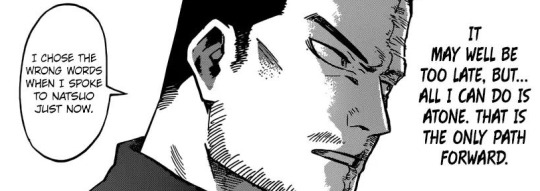
It’s not that Natsuo is angry with him and will never stop being angry with him, it’s that Enji has somehow said the wrong words by mistake. It’s not that Enji violently beat a child because he was angry that child wasn’t living up to his impossible standards, but Enji somehow just ignored Shoto’s wishes.


He always makes it sound like it was accidental, like he didn’t know what he was doing, like he somehow didn’t mean to abuse them. He wasn’t beating up a little kid he just ignored Shoto’s wishes and it somehow went wrong along the way. This complete lack of culpability that Enji has towards his own actions is also what leads him to repeat several really bad aspects of his behavior, such as hyperfocusing on Shoto to the point of ignoring Fuyumi and Natsuo, forcing Shoto to live up to his legacy and accept his help, still vicariously living through Shoto instead of letting Shoto be his own person.
Enji doesn’t address the root cause of the behavior and doesn’t change himself in any real way. The bad behavior repeats. The cycle continues. What Enji has been avoiding and what he needs to acknowledge is that there was genuine malice in the way he treated his kids. He sees his whole family as existing for his sake, to meet his own emotional needs and when they failed he always took it out on them.
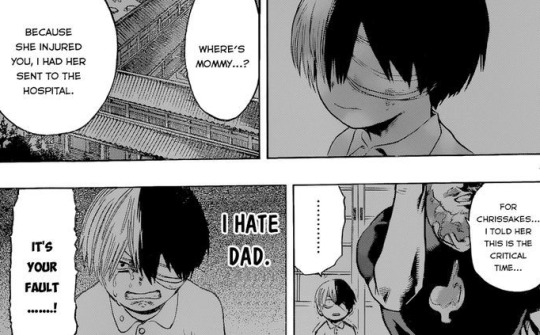
For Enji it’s always Enji first and everyone else second. It’s always primarily about what Enji wants. He doesn’t seem other people, only himself, and what he wants. That’s why when Shoto literally has half of his face burned off as a result of Enji’s actions, all Enji really cares about is that it’s going to interrupt Shoto’s training.
Whenever Enji’s family existed outside of what he wanted them to be, or got in his way in any significant way he always vented his frustation on them. He resorts to hitting for the same reason that Bakugo always feels the need to bully Deku. A grown up bully. Enji needs to make others feel small to feel assured of his own bigness. Deku has to always be underneath Bakugo, otherwise Bakugo’s worthless. Enji has to put his family back in their place. If they resist or show desires of their own otuside of what Enji needs for them he turns violent to try to force them back. It all arises from an incredibly unhealthy way of viewing himself and his own emotions yes, but it’s also something that other people suffer the consequences of.

His family exists for his sake, which is why he’s at the same time both extremely controlling of them, but also just straight up ignores the ones who aren’t useful to him.
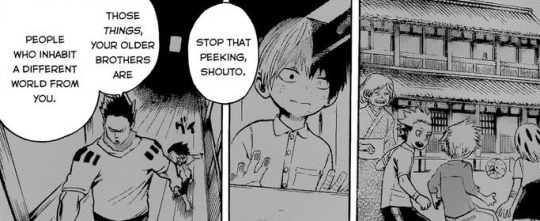
These aren’t a result of Enji going too far, these are all intentional cases of neglect. Especially if you consider the way Natsuo and the others were treated. Enji didn’t even bother to take care of them and raise them as his children because they weren’t of any use to his ambitions.

He straight up had no presence in their lives whatsoever. These are things he intentionally chose to do. For his own selfish reasons, because he thought his children existed for his own happiness and not the other way around that he was not responsible for his children.
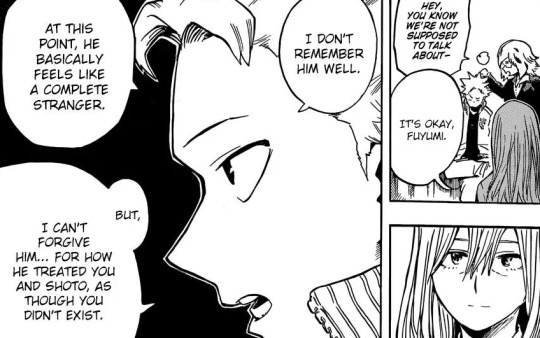
These aren’t things that can happen on accident. Neglect is as much of an abusive behavior as what was done to Shoto. It’s a parent failing even their basic responsibilities as a parent to be present and around in their child’s life.

Even the children he neglects he still controls though. When Natsuo’s cooking wasn’t good enough, Enji forced him to stop cooking anymore.

Enji had to have intentionally does these things, but when confronted with them he always acts clueless. He even claims to Natsuo’s face it was never his intention to shut any of them out of his life, even though he literally says on panel in the past that Shoto shouldn’t pay attention to his siblings because his brothers were failures.

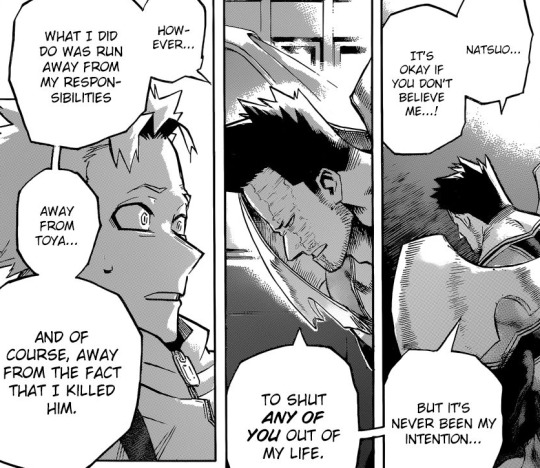

He’s even referred to his other children as things like Shoto is somehow different from them. So how can both of these things be true at the same time? Enji had to have chosen to done these things to intentionally neglect his family, so how can he claim he never meant to shut them out of his life? How can Enji both get genuinely hateful of his children, especially Shoto when they don’t act the way he wants them to, and yet also want to do the best for his family? How can he be completely absent in Natsuo’s life his entire life and yet claim to have wanted the best for him? How is Enji capable of feeling genuine remorse for his actions and realizing that they are wrong, and still have done what he did? It’s at this point we reach the psyhological excuses. The great many hoops that he’s jumped through and mental gymnastics Enji has performed to justify himself.
3. The Shadow of the Hero
So there seems to be two contradictory sides to Enji. There is Endeavor the hero who stops at nothing to be number one who sees nothing else but his ambition and his burning drive to be better, and then there’s Todoroki Enji the family man who just seems to be sort of awkward, emotionally absent, and not at all present in his children’s lives.
Endeavor is overconfident, short tempered, and also an extremely volatile person who will get violently angry if the wrong buttons are pushed. Enji is very quiet and almost self reflective. As if Endeavor is almost always burning, and Enji is burnt out. We see this same kind of emotional dissonance happen with Bakugo too, Bakugo is either on top of the world at which point he’s firing on all cyllinders and acts like an overenthusiastic angry idiot, or he’s very quiet, withdrawn and tends to dump on himself a lot. It’s important to remember that neither of them handle their emotions in any kind of remotely healthy way, so in Enji’s case it makes sense that when he’s not angry he just becomes kind of withdrawn and empty. A person who doesn’t know how to deal with emotions becomes very emotionally awkward when they’re asked to do anything besides, be angry, or punch a villain.
However it goes to a much more extreme extent with Endeavor. To the point where it does almost seem like there are two people. There’s the much more calmer, and reasonable Enji that he has been showing around his family lately.
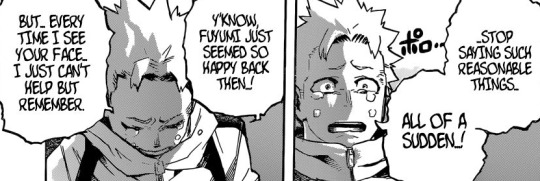
Which even Natsuo says that this change is so sudden and different it’s unnatural. I call this “good behavior” Enji. It’s when he’s restraining himself and holding himself back because he has at least realized that a lot of his interactions with his family in the past were wrong. But good behavior once again doesn’t necessarily mean a change in one’s self, because as stated above there’s a stage in the cycle of abuse specifically for when the abuser starts acting better for a period of time.
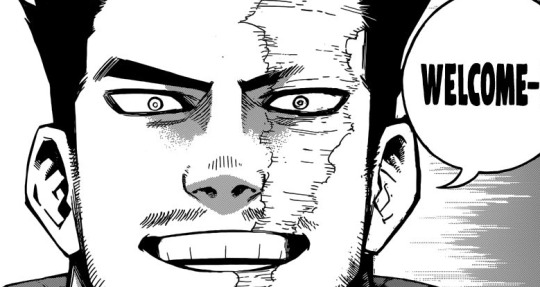
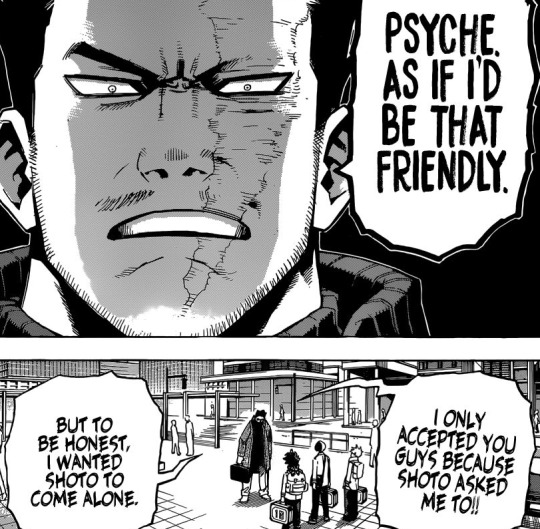
There has always been two faces to Endeavor. Not only does Endeavor see himself that way, but that’s also the way the public in general reacts to him. There is Endeavor the hero, and Enji the person. Shoto even comments on this word for word, that he knows Enji is a very respectable hero especially to the public but that doesn’t cancel out a single thing he did.
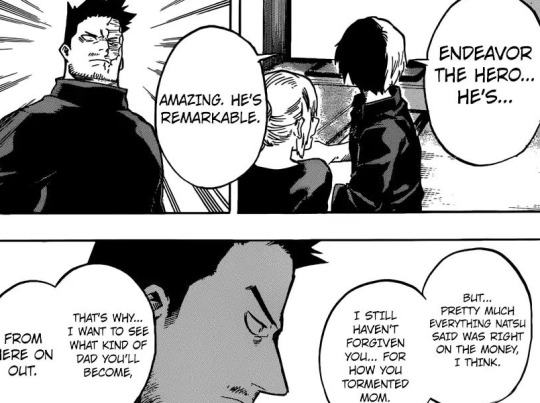
This is where we get into the psychological excuses. Enji’s arc deals with heavy Jungian themes, specifically that of the shadow.
In Jungian psychology, the "shadow", "Id", or "shadow aspect/archetype" may refer to (1) an unconscious aspect of the personality which the conscious ego does not identify in itself, or (2) the entirety of the unconscious, i.e., everything of which a person is not fully conscious. In short, the shadow is the unknown side.
Because one tends to reject or remain ignorant of the least desirable aspects of one's personality, the shadow is largely negative. There are, however, positive aspects that may also remain hidden in one's shadow (especially in people with low self-esteem, anxieties, and false beliefs).
For Enji, his conscious personality is Endeavor the hero. That’s the one everyone sees and reacts to. However, his shadow his the actions he’s done to his own family, what he keeps hidden and concealed from the world. The things he refuses to acknowledge such as how selfish his actions truly were.
Enji has a narrative for himself where everything he did was just because he wanted to be the best possible hero he can be. Even though his actions are entirely selfish, he’s convinced himself that he’s doing these things for Shoto, for his family. The problem is Enji’s entire identity is so focused around being a hero that he doesn’t really have an identity, or much of a personality outside of his career as a hero which is why he’s so underdeveloped as a person. Being a hero is his life. He doesn’t see the parts of his life that don’t relate to his career as a hero.
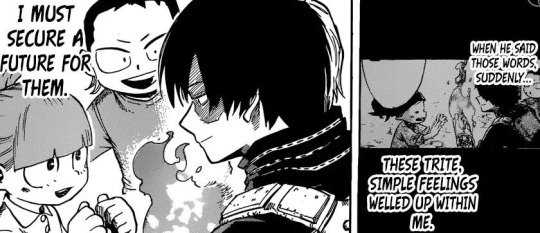
He’s able to ignore the selfish aspect of his actions. All of the contrdictory parts of his actions because he’s in denial. He still sees himself as that hero who wanted to be number one. He thinks everything he did was in favor of that and he just messed up along the way. It doesn’t occur to him that he had geniune malice towards his children, or his family because he chooses to ignore those inconvenient points of his psychology.
Enji is, two people in a sense. It’s because he revolves everything in his life around being the best hero he absolutely can be, that he doesn’t see how his actions are downright villainous. Enji is essentially trying to have it both ways. He thinks he can become the best hero that he can be, and also the best dad at the same time.
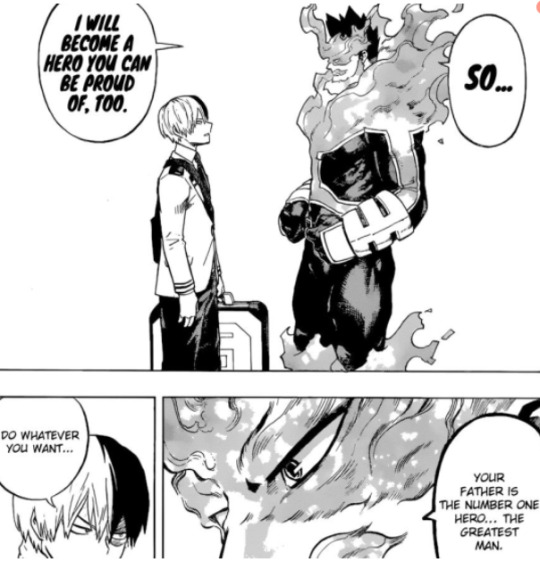
However, his behavior is the same. He’s not trying to prove himself as a father not really, he’s just doing the same thing he always did which is put his job as a hero above everything else. Enji is just so completely in his own head, so in denial of his own actions that he just doesn’t see these things.
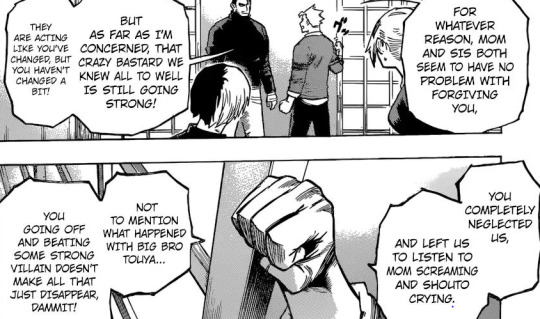
Enji’s actions are a shadow that have escaped from him because his way of atoning and fighting against his past actions is to just do the same thing he’s always did and try his best as a hero. Even though being a hero is literally what caused him to abuse his family, and Natsuo and Todoroki have both pointed out several times that being a good hero doesn’t really atone for what he did in any real way.

Enji’s narrative for himself is that his attempt to be number one was a good thing. That his striving to be the best hero he could be was a good thing. It just somehow got bad results for him. He doesn’t really understand how he got to point A and point B, and part of that is again society’s image of Endeavor the Hero is pretty messed up too. Everyone around him praises Endeavor for being a hero while absolutely nobody talks about what happened in his home life and therefore Endeavor faces no real consequences for it.

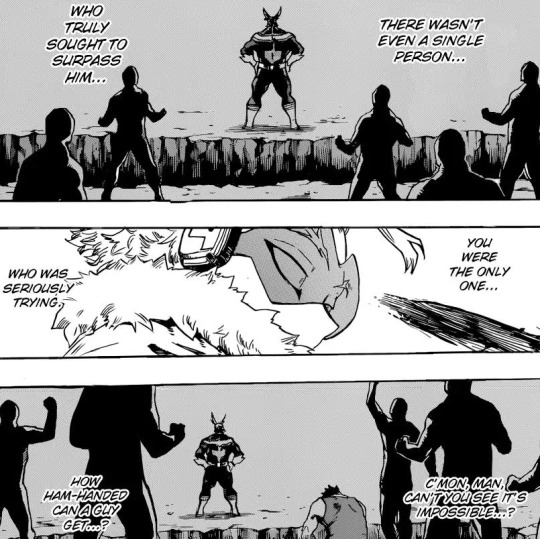
Everyone sees this heroic figure out of the image that Enji projects. Because that’s the light. That’s who he is on the surface. If you look on the surface of his actions only you just see a guy who doesn’t know how to give up, and was trying his best to be number one. It almost looks heroic to see his struggle. However, once again if you only view things from the surface you can’t really understand him or his actions. Which is why Endeavor only viewing himself as Endeavor the hero misses his own shadow and what he’s done to the other people around him.
The person who Endeavor thinks he is, and who Enji really is are two different people. This is because of that unacknowledged shadow. It’s because Endeavor has this huge selfish element to his actions that he’s just completely in denial of. Not because he doesn’t feel guilt for his actions, but because he does and he’s avoiding it.
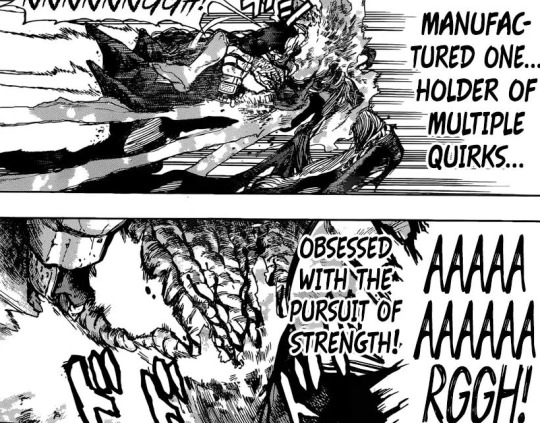
Enji sees himself in the high end Nomu he struggles against, but even that is an incorrect viewing of himself. Nomus are victims, ultimately. They were people who were kidnapped and had multiple quirks loaded into them in the name of mad science. The Nomu is Todoroki, Enji is Ujiko. He’s the one who created several children trying to mix quirks together for his own purposes and then dodged responsibility for that for years. He’s not the monster, he’s Doctor Frankenstein himself.

Enji when confronted with these behaviors, with the absolute worst of his personality, and the dark sides of all of his intentions never acknowledges them. He never tries to integrate them into who he is as a person. He just tries to fight against them and defeat them.
“Unless we do conscious work on it, the shadow is almost always projected; that is it is neatly liad on someone or something else we do so we do not take responsibility for it.”
Robert Jonson
You don’t destroy a shadow. You don’t make the bad things you’ve done and the bad parts of your personality go away. The only way to defeat the shadow is to integrate it and consciously acknowledge that you are like this. This shadow stuff is not something I’m applying to the text either, the text directly references it.
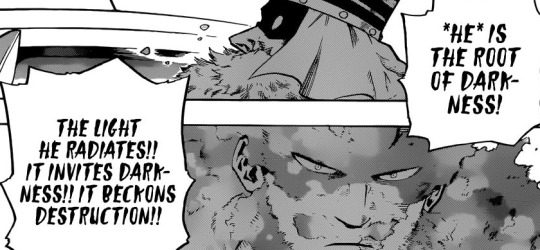
This is Jungian symbolism. The light of the conscious mind creates the shadow. It’s because people only pay attention to Endeavor that hero, that his shadow Enji the person becomes thicker and blacker. The longer people go without acknowledging it, the darker his shadow will become.
Which is why Dabi is in a way his shadow as well. The violent parts of his personality that Enji has failed to acknowledge or do anything about, part of Enji that still believes that the only thing that matters is strength.
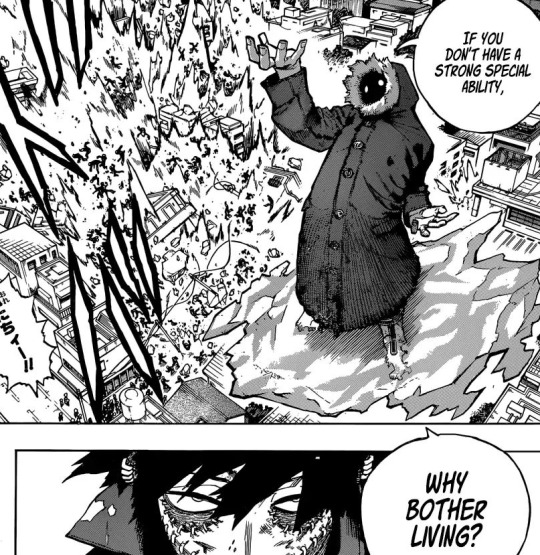
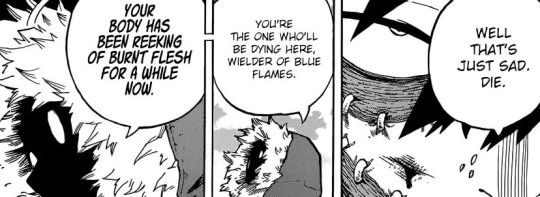
Enji would never approve of Dabi’s actions, and yet Enji also created Dabi. Once again think of frankenstein and the monster. Dabi wouldn’t even exist if Enji had never abused his family. The monster argues against Doctor Frankenstein that yes he has murdered people, but he never would have existed in the first place unless the doctor had created him which manes the doctor shares respsonsibility for even the unintended consequences of his actions. A person is responsible for their shadow, intentional or not. Dabi is the shadow of Endeavor’s actions in human form.
He exists to bring into conflict what Enji has been ignoring. That he can’t be good to his family and be a good hero at the same time, because his drive to be a hero was the source of his abusive behavior in the first place and drove him to do what he did to his family.
Enji is a very selfish person who hasn’t confronted his own selfishness in any significant way. Do I care that he’s only atoning for selfish reasons. No, that’s not the problem exactly. You could argue that all atonement is selfish in nature. The fact that Bakugo and Enji are very self-driven individuals is not necessarily the problem, it’s not a bad thing to want to be selfish, or even desire to better yourself. It can lead to good things. It’s that in Enji’s case, his selfishness always comes at the expense of others. He completely shuts people out and doesn’t even see them. All he sees is what he wants to see. Above all else this viewpoint of the world is very narrow and self-serving. He only sees the surface of his own actions. He only ever sees himself as the hero and can’t acknowledge that to his family he’s the villain.

Enji only ever saw himself and his self-centered view of the world, and everybody else, including the children he was responsible for and the wife he forced a marriage on only ever got in his way, which is why he resented them. If Enji wants to atone that’s one thing, but if Enji wants to stop being such a selfish person and truly do things for the sake of his family as he’s stated he wants to in the past that means acknowledging his actions.
Enji continues to be a hero because that’s what he wants, it’s what he’s built his whole life around. He even sees his path forward to atonement as just continuing to do his job as a hero, even when he’s told by Natsuo that won’t work. Which is why the only real substantial way for Enji to change is to actually have to give something up. To acknowledge that he’s in fact a bad hero. He even stated himself, there’s something he wants even more than being a hero now. He wants Toya to be there.
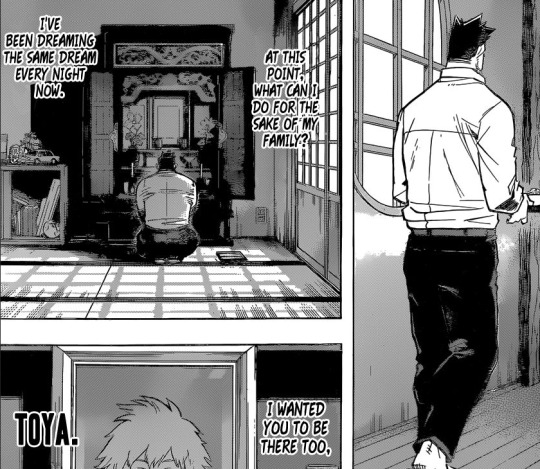
Which is why Dabi is such an important character because he not only forces Enji to realize the worst of his actions but also to choose, between what is best for himself and his career as a hero which is the only thing he’s ever really cared about and what is best for his family. It’s only in the confrontation with his shadow that we can see what Enji is really made of.
#todoroki enji#endeavor#meta#mha meta#my hero academia meta#bakugo katsuki#todoroki touya#foiling#dabi
482 notes
·
View notes
Note
Hello! I was wondering how would you have liked dani to be and how would you have liked the damira scenes to be ? (the changes you would have made to actually enjoy and ship damira)
okay quick bucket list:
recast dani with a muslim actor of color
rewrite the entire s4 script
done :)
with the funny answer out of the way... there’s simply no way that i could’ve shipped damira, i am sorry. it’s truly beyond me. nothing about their dynamic charms me or makes me think they’re better or any different than the superior option for a white/non-muslim love interest, aka amiris. i can even enjoy virihugo despite really disliking the way they got together and most of their clips anyway. (also this is a good post that explains why dani being amira’s endgame LI is a bit of a fucking joke)
however, there are a couple of ways in which i could’ve enjoyed damira narratively. and that requires heavily tweaking dani as a character as well of how their entire dynamic works. i’ve made plently of jokes of how i am Not an og purist but, if eskam had chosen at least one relationship to develop super closely as it was in og, then i would’ve wanted that relationship to be yousana. they’re my favorite pair in skam for a bunch of reasons and most of them have to do with yousef being so in contact with sana’s culture. one big example of that is the last clip of episode 9 where they go on that iconic date: it’s both a slideshow of their chemistry and sensual/romantic tension as a couple, and a showcase of the thing that makes me love them the most, which is their super long conversation about faith and their future. to me, those were the moments lacking in damira because they got too caught up on painting dani as this hyper-realized version of a LI which turned out to be a self-congratulatory asshole who disrespected amira in various ways. there were never instances in which they seriously discussed dani reverting to islam in the future, or actually conciliated their visions of their faith to really show where they were in sync and where they disagreed to start working on it. after watching the yousana date clip, i left with the impression that yousef reverting to islam was a real possibility, but i can’t say the same for dani. the damira ending in particular rewards dani for being the way he is, and the worst thing is that amira practically encourages him to never be a muslim because she loves him the way he is (what the fuck!). moreover, he never showed any interest in following amira’s conditions, never tried to familiarize himself with her culture and friends (he took her to a BAR to meet HIS friends but he’s never even shown bonding with las labass?), never really cared about anything that wasn’t to get amira to be physically intimate with him. see, when i think of the yousana dynamic i see the yousef as someone who can read the sana and therefore know what to say and do, not because he only wants to charm her but because he genuinely cares about her. even sofianne showed some of that on the earlier episodes of skamfr s4, but that’s completely lost on damira and dani in particular. and i’m not gonna pretend that this task is possible to do with a white, christian-raised love interest. for this to work, whoever sp!yousef is has to be way more in sync culturally with amira.
a way to partially solve that issue is to make dani be honest to amira throughout the season. i don’t doubt he���s genuinely into her but then he doesn’t communicate her his doubts about the relationships and lies to her about the whole “the only problem in our relationship is the haters <3″ bullshit that he spews out for three entire episodes. moreover, dani being honest from the start would’ve given amira enough hints (red flags) that dani didn’t really take any of her conditions seriously and he was just waiting for her to be less strict about the terms that he agreed on, and maybe there would’ve been a real critique to the character that 1) didn’t make amira look like an “annoying religious fanatic” (which she wasn’t at all lol) to most of the white audience who sided with dani when the relationship started falling apart, and 2) taught an actual lesson to amira about how would a relationship between a white dude who has no intentions to be muslim in the future would go like. i can understand why eskam still left the question pending on the air as they wanted to give amira an endgame and they probably didn’t want to make it seem like muslim/christian relationships don’t work in the slightest when this is the first mainstream show with a hijabi protagonist in spain... but eh. fucking cowards.
if it’s not obvious by now, to me, the ideal version of damira is the one where they’re not endgame by any means, even going to the point that i really dislike that dani even likes amira back. i would’ve really loved if dani stayed in amira’s daydreams throughout the season, where her idealized version of a childhood friends to lovers story is quickly replaced by a more realistic relationship with someone who actually makes efforts to be with her (cough cough bi!kasim anyone?). in that case, dani can be as douchebag-ey as he was for the entire season, idc, but now the show would really acknowledge that and drive the message that amira deserves someone who’s attentive and respectful and genuinely loving of her. and hopefully say that without making it seem like it’s impossible for muslims to date non-muslims: more like, it’s unlikely for amira to date dani in particular, and only because he clearly has no interest on following on the things that she values the most - which is a message that applies to every relationship, honestly.
if i had free reign on completely redesigning dani’s character and the damira dynamic, then i would make dani way more understanding and have his clumsiness be acknowledged and criticized instead of both the characters and the audience using it as a justification time and time again. he’d show genuine interest in islam, he’d thoroughly discuss boundaries with amira to assure that they’re both comfortable, he’d made sure to safely insert himself on her spaces and not just drag them to bars and basketball courts on every date, they’d have SO many conversations of faith that truly make him a nuanced character and also help flesh out the reasons of why amira loves being muslim. which i think are just ways of dani respecting amira’s agency and showing genuine interest on her besides his initual infatuation, as all the other endgame LIs of the show have done it. i’d completely erase the stupid “uwu islam won’t let me kiss dani/viceversa” plotpoint from existence, for SURE. with all of those changes i would be neutral on the existence of damira as i am with virihugo, i think. but also the thing that truly holds me back is that... just, the lack of characters of color in the show. with the way kasim was only used as a plot device and dounia was written out off her best friend role very early in, we truly don’t even have a significant presence of muslim people of color in amira’s season. whitewashing yousef is a big part in that too, and that’s why people were so eager to believe that kasim could’ve been amira’s endgame for this season.
#skam españa#also adding onto that last part: that's also a reason why i can't be sold on virihugo#because in orden for them to get together dilan had to be portrayed as ridiculous needy and undesirable#and when the rest of the boy squad are all taken conventionally attractive white guys... that's a big issue too#just being a latina of color tingz!#norge anon: lol. definitely not obsessed with norway in any way :( i'm just sad that people might have thought that about me LMAO
21 notes
·
View notes
Text
I’m really tired of seeing thinly (or not so thinly) disguised insults towards anyone who has even a few criticisms of the Loki show. These insults often come with an air of self-believed intellectual superiority and condescension. Whether it’s intended or otherwise, there are underlying implications and insinuations in common arguments I’ve seen a lot of, which basically boils down to the following:
You can’t distinguish between your own personal headcanons and reality = you'll push your own idea of what something should be onto something so much you won’t even be aware of it and you’ll be frustrated when it doesn’t meet those expectations. You don’t have enough self-awareness to tell the difference between what exists in your imagination and what exists in reality (unlike me, who doesn’t need to push any ideas about what I’d like in terms of characterisation because I personally believe the show already happens to reflect that)
You don’t understand the nuance of it = you’re not intelligent enough to think in shades of grey and varying degrees of subtlety and interpret this (the same way I do). Your thinking is shallow and your ability to analyse lacks depth. Regardless of your justification, if you think there are OOC moments, then you’re just failing to pick up on the nuance. You need someone (such as me) to hold your hand and tell you what to think and how to see (what I claim) is really there
You don’t understand how storytelling works = you can’t recognise any devices used and why they’re used. (Unlike me, you’re not clever enough to understand what the show is doing and the purpose of why it’s doing it.) If you criticise some of the execution of the storytelling methods the show has adopted then it can only be from a lack of understanding on your end and nothing else
You just want the show to be like fanfiction = you’re incapable of wanting different things from fanfiction and canon and you don’t have the intelligence to recognise this. (I know this because I can recognise this and ‘diagnose’ it in other people)
Loki’s obviously acting to trick the TVA/people into underestimating him = it’s idiotic not to interpret this theory that’s currently unconfirmed in canon as of S01E03 the same as me. If you have doubts then you’re incapable of picking up on the clues that (I personally believe) are there
You’re determined to not like the show. You want to tear it apart = all of your opinions and arguments can and should be rendered invalid regardless of your justification. If you don’t like certain aspects then it’s because you never gave the show a fair go to begin with. Therefore, you’re narrowminded and it’s your own fault if you don’t like it/elements of it because you never wanted to like it in the first place. You want to be miserable
You’re all the same = you can’t think for yourself. Each one of you can be generalised to one hivemind-like entity with no variance in opinions or your justification of them and you’ll blindly follow each other without any critical thought. If you express criticism, you’re now an anti. It’s black and white: either you’re completely pro-show or anti-show and there’s no room for anything in between
You’re stuck in the past = if you’re not completely onboard with any tonal and character changes you find jarring then you’re incapable of accepting change. You just want something unimaginative and uncreative and boring (which I might imply reflects your personality)
It’s not until now that Loki’s finally shown in character = people who thought he was in character in previous movies are wrong and aren’t real fans if they don’t accept this. There’s no room for extrapolation from previous movies, and if you do that then you’re just using your own headcanons so you must be wrong about any perceived changes in his character. (But if I extrapolate from previous movies to justify some of the show’s choices with his characterisation, then that’s completely fine)
You’re making your mind up before the whole show is even released = you can’t have any opinions about the show so far until you’ve seen all the episodes. (Unless, like me, you’re happy with the show)
If you’re reading this and are agreeing with the takes on anyone who expresses so much as a few criticisms, then please read the rest of this post.
I want to emphasise that it’s only a fraction and far from all people who like the show who I’ve seen these kind of takes from, and I have nothing against people enjoying the show. It’s only when I see stuff like the claims listed above that I become frustrated.
People will have different takes and interpretations, it’s only natural. No one can call an interpretation of a character and/or how they’re presented objectively wrong or objectively right. But that doesn’t mean it’s acceptable for anyone to resort to insulting others (whether blatantly or through implication) who have opinions that differ to their own.
Just as a thought experiment, let’s try this the other way around, shall we? Let’s imagine that some of the people who aren’t enjoying aspects of the show start spreading posts about the people enjoying it. If this was to occur, there’d probably be posts about how anyone who thinks he’s in character will blindly go along with whatever show creators tell them, that they (the fans of the show) must have never understood the depth of Loki to begin with so they can’t be real fans, that they’re so determined to enjoy the show that they’ll twist the narrative to suit their own needs and desperately invent reasons to accept it...
I could think of more but I’m going to stop here because, ultimately, it’s not nice, is it? It comes across as a super shitty thing to do for a reason: it is super shitty.
I hope it goes without saying that I'm not claiming the examples I made up are true. No one should be claiming anything like the things I invented for my thought experiment are true in public, no matter where on the spectrum of opinions on the show they sit. It’s rude and insulting and would contribute greatly towards further fandom division and a toxic environment filled with feelings of hostility over something fictional to begin with.
No one is intellectually superior for their opinions on a TV show. People can and should feel however they feel about the show. In an ideal world, they should be able to express that without any harassment or being treated in a derogatory manner or made to feel like they have no place in fandom. This goes for negative opinions and positive opinions and anything in between.
I just really wish people would keep their opinions restricted to the content of the show itself rather than reactions to it sometimes for reasons like this. If groups of people can’t do it without feeling the need to make it out like they’re intellectually superior and anyone who expresses opinions that differ to theirs must be stupid then maybe they shouldn’t be doing it at all. Especially when the overwhelming majority of the more critical people go out of their way to tag their stuff so more positive people can avoid it if it gets them down. More critical people don’t have to do it, but the vast majority of the time they do it as a curtesy. It’d be nice if that curtesy wasn’t repaid by being so disrespected.
And please, before piling on someone’s post about how they’re just lacking a nuanced understanding or are applying their own headcanons, maybe consider that your own interpretation of someone’s opinion could be doing precisely the same thing.
One final thing I’m adding as a preventative measure: if your response to reading this is something along the lines of going ‘but some people really can’t distinguish their headcanons from reality!’ then you’ve really missed the point. The point of this post isn’t to debate whether or not every claim is valid (that would have to be a case by case analysis, and it would be so open to interpretation that you could never reach a definitive conclusion anyway, so it’d be pointless). The point is that it’s incredibly rude to publicly insult someone’s intelligence and make up a bunch of condescending assumptions about them based on their opinions. If you’re treating someone or a group of people in real life like that (and yes, if they’re from the internet then they’re still real people) then you’re doing something far worse than the people I’ve seen branded as toxic people for expressing criticisms of fiction.
*For the record, I’m not saying that anyone with criticisms has never said something along the lines of my thought experiment examples. I haven’t seen any of that myself, but I’m not all knowing. I’m just reflecting on what I have seen, and the vast majority of it has come from a fraction of people without (or with far fewer) criticisms of the show. But it’s irrelevant who it comes from, because my point remains the same: it’s shitty regardless of who says it
4 notes
·
View notes
Text

Hey there, anon.
First, let me start by saying that I truly appreciate exchanging ideas and debating topics; I believe that’s one of the best ways to reach a deeper understanding, having a lot of different perspectives brought into it. But I’ll only do it if we keep it respectful. And if there’s interest in discussing this issue (and I’m assuming there is because you did send me this ask) we’ll need to first examine our own emotional reactions to it and see if we’re ready to be clear-minded about it. It is only possible to discuss ideas if we’re open to different ones in the first place.
Second, I want to make clear that I won’t try to convince you of anything nor, frankly, is that the point. All that I can do is present the information that we have and then offer my personal reading of it. What your takeaway is, concerns only you. But it is also wise to examine our own motives approaching this exchange; mine is to reach a deeper understanding of these people. If it was only a battle of wills, or each trying to “win” the argument by conquering the other with their strong pre-conceived notions, I’m afraid it wouldn’t be half as enlightening. I’ll proceed in the good faith that we’re all here seeking a greater awareness of other human beings’ inner lives.
And lastly, if we do want to get a look at those inner worlds and emotional landscapes, we have to actually look inside. This means we can’t take every word at face value and realise that every intervenient is dealing with their own complicated feelings, motives and biases; that means the initial subject, the surrounding associates, and finally, even ourselves. The best we can do is develop the critical sense and emotional intelligence necessary to be aware of all these different factors.
So, all preparations done with and guidelines established, let’s actually address your points.
I’ll start providing an excerpt of the Yoko Ono interview you’re referring to:
I ask if she has ever had sex with a woman, or been attracted to them.
“Well, that’s another thing. John and I had a big talk about it, saying, basically, all of us must be bisexual. And we were sort of in a situation of thinking that we’re not [bisexual] because of society. So we are hiding the other side of ourselves, which is less acceptable. But I don’t have a strong sexual desire towards another woman.”
Have you ever? “Not really, not sexually.”
One online satire imagined an affair between Ono and Hillary Clinton.
“It’s great,” Ono laughs. “I mean, both John and I thought it was good that people think we were bisexual, or homosexual.” She laughs again.
What about that old rumor that Lennon had sex with Beatles manager Brian Epstein (which was also the subject of the 1991 film, The Hours and The Times)?
Lennon himself said: “Well, it was almost a love affair, but not quite. It was never consummated. But it was a pretty intense relationship.” Later, Lennon’s friend Pete Shotton said Lennon had told him that he had allowed Epstein to “toss [wank] him off.”
“Uh, well, the story I was told was a very explicit story, and from that I think they didn’t have it [sex],” Ono tells me. “But they went to Spain, and when they came back, tons of reporters were asking, ‘Did you do it, did you do it?’ So he said, ‘I did it.’ Isn’t that amazing? But of course he would say that. I’m sure Brian Epstein made a move, yeah.”
And Lennon said no to Epstein?
“He just didn’t want to do it, I think.”
Did Lennon have sex with other men?
“I think he had a desire to, but I think he was too inhibited,” says Ono.
“No, not inhibited. He said, ‘I don’t mind if there’s an incredibly attractive guy.’ It’s very difficult: They would have to be not just physically attractive, but mentally very advanced too. And you can’t find people like that.”
So did Lennon ever have sex with men?
“No, I don’t think so,” says Ono. “The beginning of the year he was killed, he said to me, ‘I could have done it, but I can’t because I just never found somebody that was that attractive.’ Both John and I were into attractiveness—you know—beauty.”
I ask what she makes of the people outside the building, the crowds still at Strawberry Fields.
Ono misunderstands, or mishears (or is simply focused on the last strand of our conversation), and continues to talk about sex.
“I don’t make anything out of it. When you’re not really interested in that sort of sex, you don’t think about it. Both John and I surprisingly were very passive people. Unless somebody made a thing out of it, if they made a move, I wouldn’t even think about it.”
— in Yoko Ono: I Still Fear John’s Killer by Tim Teeman for the Daily Beast (13 October 2015).
You may not believe Yoko. But it is also important to understand if it’s because of her unreliableness as a witness (Yoko is excellent at PR and marketing, and John Lennon is the brand she’s built her life upon) or because of what she’s saying (John Lennon being interested in men). If it’s the first, that’s a reasonable worry, but like I said, you just have to possess the critical sense to be aware that that’s a motivation that is there and examine what she says with that in mind. If it’s the second, there’s a lot more testimony available from people other than Yoko that may help illuminate the matter. One of my favourite sources is John himself. But more on that in a minute.
But let’s go with the first one, for a second. That Yoko is someone with personal feelings, biases and motivations, one of them being that her livelihood depends on the maintenance of her continued association with the John Lennon brand and the fairytale JohnandYoko narrative she’s been promoting since 1968. Why then would she be one of the main voices claiming John’s bisexuality? And she gives us the answer in this interview: “both John and I thought it was good that people think we were bisexual, or homosexual.”
Consider that their image was that of the avant-garde, anti-establishment, bohemian couple. Like Yoko said, it not only generated press but was also very in-brand for people to think they were bisexual. John himself put it on similar terms when he asks himself, on November 1974, “It is trendy to be bisexual and you’re usually ‘keeping up with the Jones’, haven’t you ever… there was talk about you and PAUL…”.
As singer Chuckie Starr told Christopher Andersen [author of Mick: The Wild Life and Mad Genius of Jagger]: “[1973] was the glitter era, and everybody wanted to be part of the bisexual revolution.” It’s relevant then to remember that the rock world was full of stars coming out as bisexual during this period: Elton John, David Bowie, Mick Jagger, Lou Reed, etc. All four ended up somewhat retracting their statements: Elton John officially came out as gay in 1992, and the other three simply renounced their bisexuality in the 1980s, in the wake of an increasingly conservative culture and public panic over the AIDS crisis.
Now, this is an entirely too complex a matter for me to get into in this post: trying to figure out what was the “truth”, to separate one’s genuine interests from the context of the times. Did the “bisexual chic” being a fad during the 1970s and good publicity for those involved make the experimentations undertaken any less true? Were they faking it for the press or liberated enough to try? Are the take-backs fruit of them having decided that just wasn’t it for them or are they a reflection of what was socially acceptable at each moment? Is it like John and Yoko decided that “all of us must be bisexual. And we were sort of in a situation of thinking that we’re not because of society” or was that just the free-love idealism of the times?
I feel like Yoko’s statements come from that perspective that it’s all about experimentation. Bringing up the famous Norman quote, “From chance remarks [John] had made, [Yoko] gathered there had even been a moment when—on the principle that bohemians should try everything—he had contemplated an affair with Paul, but had been deterred by Paul’s immovable heterosexuality.”
I don’t know if the bohemian ideology was offered by John as a justification, but I suspect these were Yoko’s own rationalizations coming into play, perhaps in an attempt to create an emotional distance in John’s interest in Paul, claiming it was all about the experience and the physicality.
(It also remains frustratingly unclear if the “[John] had been deterred by Paul’s immovable heterosexuality” was part of Norman’s readings, Yoko’s gatherings or of John’s chance remarks.)
Another informative bit is this: “I think [John] had a desire to [have sex with other men], but I think he was too inhibited. No, not inhibited. He said, ‘I don’t mind if there’s an incredibly attractive guy.’ It’s very difficult: They would have to be not just physically attractive, but mentally very advanced too. And you can’t find people like that.”
First, I’d like to point out that while in this interview Yoko says that John never found anyone both physically attractive and emotionally advanced enough to consider having sex with, she did tell Norman that he’d considered having an affair with Paul. So John did find someone like that.
Secondly, I find it extremely revealing of John’s view of sex that he doesn’t consider it enough to be physically attractive, but he’s also seeking mental compatibility and stimulation. This tells me that John wasn’t interested in it merely as bohemian experimentation or just the physical release of a one-off thing. He was actually searching for the qualities necessary to maintain a longer relationship.
I personally think that for John, ideal sex was personal, and an epitomization of intimacy and closeness. (He always was a romantic.)
In interview with Sandra Shevey (June 1972):
JOHN: It’s a plus, it’s not a minus. The plus is that your best friend, also, can hold you without… I mean, I’m not a homosexual, or we could have had a homosexual relationship and maybe that would have satisfied it, with working with other male artists. [faltering] An artist – it’s more – it’s much better to be working with another artist of the same energy, and that’s why there’s always been Beatles or Marx Brothers or men, together. Because it’s alright for them to work together or whatever it is. It’s the same except that we sleep together, you know? I mean, not counting love and all the things on the side, just as a working relationship with her, it has all the benefits of working with another male artist and all the joint inspiration, and then we can hold hands too, right?
SHEVEY: But Yoko is a very independent person. Isn’t it— [inaudible]
JOHN: Sure, and so were the men I worked with. The only difference is she’s female.
SHEVEY: But you didn’t find it difficult to make that transition?
JOHN: Oh yeah. I mean, it took me four years. I’m still not – I’m still only coming through it, you know.
See how for John sex is just an extension of all the other ways to show physical affection, that he had craved while “working with other male artists”? “The plus is that your best friend, also, can hold you without…”; “it has all the benefits of working with another male artist and all the joint inspiration, and then we can hold hands too, right?”
And I don’t know of many outright negations of John being homosexual or having interest in men, but this one, “I’m not a homosexual, or we could have had a homosexual relationship and maybe that would have satisfied it, with working with other male artists” sounds more like an admission to me. Of course he had to throw that “disclaimer” in there after saying “The plus is that your best friend, also, can hold you without…” Without what, prosecution? Because you’re both men? John had to save face; he would have been practically both coming out and declaring his longing for his recently divorced male best friend.
“We could have had a homosexual relationship and maybe that would have satisfied it…” Satisfied what? Satisfied whom? Paul was satisfied. The declaredly unsatisfied one was John.
As for your point that John couldn’t be open to the subject because he was a homophobe, there is the likelihood of internalized homophobia.
Defined by Meyer and Dean in 1998 as “the gay person’s direction of negative social attitudes toward the self, leading to a devaluation of the self and resultant internal conflicts and poor self-regard” and by Locke in that same year as “the self-hatred that occurs as a result of being a socially stigmatized person”, internalized homophobia can make a queer person both hateful of themselves and other LGBQ people.
John himself realised and admitted that his violent conduct when accused of being gay as a young man, was born out of his insecurities about his own sexuality: “And obviously, I must have been un– uh, f– frightened of the fag in me to get so angry at that. You know, when you’re twenty-one, you want to be a man, and all that.”; “I must have had a fear that maybe I was homosexual to attack [Bob Wooler] like that and it’s very complicated reasoning.”
And it soon became apparent that his instances of homophobia, like the rest of his outwards aggressive demeanour, were only posturing.
If you’d like to read more about the topic of John dealing with his sexuality, I’ve recently answered two more asks about it: on the Bob Wooler incident and on the Tony Manero story. For more examples and anecdotes you can always consult the tag.
There are really too numerous examples of John expressing his openness and sympathy with the LGBQ struggle, sometimes including himself in that pain. Some examples are more subtle than others, but it’s there if we ourselves are open to that possibility.
Now, let’s focus on your last point: the people in his life that defended his heterosexuality. We’ll have to afford them the same depth and critical eye, in examining their statements that we’ve been giving Yoko and John.
For Cynthia, I apologize, but I couldn’t find any statement on John being straight, but if one is provided I’d be happy to comment.
As for John’s half-sister, Julia Baird, I do have a quote:
“Brian Epstein, the Beatles’ manager, was a known homosexual. Epstein was always polite and charming. It has been insinuated that John was drawn to Epstein. I believe there was no such relationship between them. John was macho. But if John was a homosexual, it would have made no difference to me. I’ve asked Paul McCartney, who laughed and said: ‘Why not me? I’m handsome.’ Then he said: ‘I was holed up with John in hotel rooms everywhere. There was never a suggestion of anything like that.’ I believe him.”
— Julia Baird, in Boston Globe: Lennon’s half-sister remembers… (2 October 1988).
Again, we have to put ourselves in her perspective. This is a person who contacted with John for some years as a young girl and he obviously made an impression on her; the teddy boy, her cool big brother. It is understandable that she would not want her memory of him threatened. People often cling quite strongly to the idealised image they have of someone.
But her statement that John was macho (and therefore couldn’t be attracted to men), shows how far her understanding goes both of homosexuality and John himself.
So if her image of John reflects only his surface-level projections of a macho tough guy, is fixed on the teenager she knew as a child, and doesn’t go deep enough to realise how soft and insecure he really was, then what can we expect from her assessments on his sexuality (especially considering her view that homosexuality seems to threaten the masculinity of a man?)
And finally, we have Paul.
Paul’s relationship with the subject of John’s sexuality almost deserves a post of its own. [And I had in fact written quite a lot about it in this post before it suddenly closed without saving.] But the multitudes of emotional dynamics and levels of perception going on in there are so numerous that I think a new post really is better suited. I hope to get to it soon.
But let me just say here that there are a myriad of reasons why Paul would state that to his knowledge John was never gay, and none of them invalidates John actually being attracted to men. If he was or wasn’t is completely up to him, and from his own statements about it and his behaviour that was certainly something that he seemed to be exploring about himself.
Or at least, this is my reading of it. I only can guarantee you that I’ve certainly made the effort to examine all the possible motivations present, including my own. But what you take from here anon is, similarly to John’s sexuality, up to you entirely.
-
[Note: I’ve answered this ask despite feeling a certain defensiveness from the sender, that I feel translated in a kind of hostility in the language. Maybe this wasn’t the original intention but it was what it felt like to me. Hence the introductory disclaimer that it only makes sense to send an ask if one wants to discuss ideas and hear my opinion on a subject. If there is no openness to have this discussion in the first place, I’ll reserve the right not to respond either. Thank you, and please keep the exchanges ongoing but respectful.]
#John Lennon#yoko ono#paul mccartney#the beatles#cynthia#julia baird#asks me why#I'm not a homosexual or we could have had a homosexual relationship#the person I actually picked as my partner#johnny#macca#3rd verse#solo#meta#my stuff#(I feel kind of underwhelmed by this post because I wanted to get to Paul's part.#(But having written it all and then losing it just made me feel like not writing it now. Maybe soon. I hope this is enough.)#(Also Tumblr censured the original draft for some reason? An only text post was against their guidelines? That's why the ask is a screenshot
82 notes
·
View notes
Text
Why it’s bad — not just not helpful, but actively harmful — to go out on your way to shit on* people who might not vote Biden:
(Premises: truth is good and important, kindness is good and important, my audience is generally left of center and does not like Biden’s opposition, anybody reading this basically wants to do the right thing, the idea that the means justify the ends is kind of situational: sometimes how important your end goal is does actually affect what methods of getting there are appropriate (pushing someone away from you is excessive if they said something you didn’t like but appropriate as defense against assault), but also some things are always just wrong. Also, that climate change is a global existential threat, covid-19 is real, imperialism is bad, Black lives matter, there is no moral justification for the US to restrict immigration at all let alone anything about how undocumented immigrants are being treated, the prison system is extremely racist in practice and not actually a good idea in theory either, etc.)
People are stubborn cusses who don’t like being told what to do. Personally I’m not going to hold up “be nice to me or I might do the opposite of what you want just to spite you” as a threat because fuck I’ve got more self control than that and I know the stakes are sky high. But realistically: some people really are contrary enough to do that. So, demanding rather than asking or arguing for a thing is always a risk. (Demanding often feels safer. But that’s an illusion.)
People are stubborn cusses who don’t like being told what to do. And especially certain kinds of people — people with a history of being bullied or abused — tend to be very sensitive to being pressured, manipulated, or coerced into doing what other people want them to do. So it can harm relationships between people and between factions of the Left when some people/factions are demanding that others act a certain way, especially when the demands come attached to negging-like statements. (I get there’s a place for eg just shutting down terfs or Nazis. This isn’t that kind of thing; no one’s argument is based on the idea that other people aren’t really people here. At least not on the “don’t tell me what to do” side of this. Also, it’s possible to deplatform people without telling them they don’t really believe what they say they believe.)
It’s not polite and is not really ethical either. Consider: “if you cared about me you’d wash the dishes”, vs “hey, it’s your turn to wash the dishes.” “If you really held progressive values, you would vote Biden (and by implication, not criticize him until after the election)” follows the same pattern. “The fewer people vote Biden, the more likely it is that (the Republican candidate) will win the election” is a neutral statement of fact, and not one of the things I’m objecting to. It’s also not something I’ve actually heard anyone say this election cycle.
It’s not constructive, because getting people who are already likely to vote Democrat to actually vote is a better use of everyone’s time than trying to persuade someone who has already decided not to.
It’s not constructive, because if you want to change someone’s mind this is not how you do it. See point 1.
It’s not necessary: it’s possible to express support for Biden as a candidate and encourage people to vote for him without mentioning the existence of people who might not vote for him at all. Even if in the moment you feel motivated to express support for Biden because you read a post by someone expressing a lack of inclination to vote for him.
If you’re not sure about that claim that it’s not constructive (fair — you should be suspecting me of motivated reasoning), look at what people who actually run campaigns do. Is Biden insulting people who don’t want to vote for him on Twitter? Is the Democratic Party asking volunteers to insult people who don’t want to vote Democrat, as a way or contributing to the campaign? Is it paying people to do that? No? I wonder why that is? Maybe that’s because insulting people who don’t want to vote for a candidate doesn’t actually win campaigns?
Put yourself in someone else’s shoes. Remember a time when someone insulted you for not agreeing with them. How did you feel? Conversely, think of a time when you changed your mind about something. How did that happen?
Why it’s actually OK to talk about being unenthusiastic about voting Biden (even if you really want him and not his opposition to win the election):
Well, fuck, look for another post on the subject I guess.
Some notes on impulse control:
Sometimes, another person says something on tumblr and you’re like “fuck yeah” and it just feels right to you and you reblog it. Maybe that’s where some of this is coming from: people who’ve decided to definitely vote for and fully support Biden (reservations notwithstanding) see a post, feel frustrated, go “yeah that’s right,” and reblog without really thinking about how it’s going to come across. That’s understandable. People tend to use social media to relax and unwind; we don’t necessarily bring our full game to it.
If that’s going on, maybe learn to recognize this pattern (recognize when a post that’s a feel-good vent to you is really hurtful to someone else, because it’s manipulative af) and think twice before clicking post? Maybe in general get in the habit of taking a breath/five seconds before posting or reblogging something? I realize for many of us that’s easier said than done, and it can be a work in progress. I’m not proud of everything I’ve hit post on even after I’ve given it some thought.
Maybe some people have an attitude of “well, if anyone is hurt by this, I don’t want them on my blog anyways.” I’d suggest, as an in between measure, tagging this stuff. “Biden” or “us politics” or “election 2020” or something. Explanation for why people who might have this kind of reaction might still be people who share your values either right before this post or right after, depending on what order I decide they’re done in.
Now, I messed up here. My first five or six reactions to this sort of post was not a positive one, but I wasn’t sure whether I had a good reason to not like them or was just...reacting. I have mental health issues and sometimes have much stronger reactions to things than the things warrant. So I just...didn’t say anything or do anything until it got to be too much and I lost my shit. Not ideal. If I had to do it over again, I’d send politely worded messages to people I wanted to keep following who were posting this stuff, asking them to not do that and briefly explaining why. But, I’m at a point where I can’t do the politely worded thing, which makes actually directly addressing the people who are doing this a much trickier proposition. So. Here we are. And I’m blogging to whoever the fuck reads my blog (other than my husband, who really doesn’t deserve any of this) like that’s actually going to help.
At least it’s making me feel better.
* “shit on”: this isn’t about the sort of posts that are all “vote for Biden!” Or “vote for Biden because ... ” or “I’m voting for Biden because...” or “here’s some non-straw-man arguments for not voting Biden that I’m going to disagree with in a way that basically respects that someone can make one of those arguments and be a fundamentally decent person also.” This is about the posts that are all “if you’re considering not voting Biden you are a tentacle monster from the dimension of non-Euclidean geometry, and also incredibly stupid because the only reason someone might do this is this tissue-thin straw-man argument.” And it’s certainly not about the posts that are “you might want to deliver your mail in ballot in person if that’s possible where you live” or “check to make sure you haven’t been dropped from the voter registry” or other posts that actively address barriers to voting or getting one’s vote counted. Those are good, keep doing those.
#political#us politics#biden#election 2020#swearing#long post#rage post#personal#appeal to reason and decency#thinking things through#i hope this comes across as vulnerable and trying to engage in authentic dialog#and not just angry#although i’m not sure i want actual dialog in the sense of anyone responding to this#because i’m not confident in anyone who defends this behavior being able to argue in good faith
1 note
·
View note
Text
THIS NEVER GETS OLD
Original title: This never gets old.
Prompt: Penelope and Luke fixing up the attic.
Warning: none.
Genre: comic, funny, romantic.
Characters: Penelope Garcia, Luke Alvez.
Pairing: Garvez.
Note: part 63 in Garvez canon Life.
Legend: 💑😘.
Song mentioned: none.

GARVEZ STORIES
THIS NEVER GETS OLD
Penelope sneezes once. And then again. At the third she manages to stop for a moment and Luke hands her a tissue, looking at her badly. -I'm allergic to dust.- she says, as a kind of justification.
The man continues to stares at her in a serious way. -I remember.- he looks up at the sky as she blows her nose. -That is why I brought you that mask.- he exclaims, with a disillusioned and disappointed tone, putting it in her hand without much compliment.
She looks at the object with mock circumspection, tilting it in every position, almost looking for a bug or something that could hurt her. -Oh, you are too sweet.- she says, therefore, using exaggeratedly sweet nuances, and therefore clearly constructed. -I mean too sweet.-she emphasizes the third word, raising an eyebrow. Luke can't figure out where she really means with this scene, but he feels confident enough not to worry seriously. -How I can criticize you and tease you, if you behave so perfectly?- in the end, thankfully, she provides him with the right clue to understanding, perhaps moved by his bewildered gaze.
The first instinct is to laugh. -Sorry.- the man holds up his hands as if they were about to arrest him. -I'll try to do the wrong thing, every now and then.- he exclaims, unable to hold a smile, his smile, the crooked smile on his face. -Ok?- Penelope is lost in his brown eyes. After a second of suspension, they both burst out laughing, perfectly synchronized. -Come on, let's start.- he is the first to recover. -We do an examination of conscience and what we don't need anymore, let's put it in these boxes.- he indicates some brown boxes, empty, lined up neatly one next to the other. -It is useless to keep all these things piled up, if we never use them.- it is the voice of rationality, but she doesn’t want to listen to it. She managed to avoid it untile now, and it doesn't seem right to give in right now. Maybe she should rent one of those garages, those on which they even did a TV show, and upon her death, Luke would discover she has a fabulous legacy of dusty plushies and other priceless junk.
She turns from the opposite side to his, to hide her expression, then regains control of her emotions. -Ok.- she says in a neutral tone. -But you must know that my grandfather was a serial accumulator.- she warns him, without a trace of irony. -I inherited this kind of disease from him so I can't throw away anything.- a justification she hopes will be enough to put off this infamous task.
Luke doesn't even try to hold back a laugh this time. -I see.- he sighs and begins to rummage in the first box, which seems to have contained a pair of boots, for women, long above the knee. He is about to ask why he has never seen them, but then... -What were you doing with all these receipts, Pen?- he asks, trying not to look too bad.
-I got them to various places in America I've been to.- she replies, reaching him immediately to snatch the contents from his hand. -They are not the shopping receipts of each week.- she is keen to point out, in a tone of "who do you think am I?".
He nods, pursing his lips. -I think there is a problem.- he lifts a handful of pieces of paper, almost like confetti, and makes them flutter around him. -Look.- he says.
-Oh no!- she immediately understands the extent of the damage. -They all became white, nothing can be read anymore!- the broken voice and the wide-open eyes. But she's not crying.
-Yes.- another sigh. -I'm sorry.- he strokes her shoulder. -Are you okay?- he asks calmly.
-They were only receipts, after all.- she is trying to convince herself. -I'm fine, Luke, really.- and as usual, he is not buying it, but he goes further, for now.
After a while he breaks the silence exclaiming in a genuinely surprised tone -Hey, look what I found!- she turns to him. -They're like music cassettes.-
But the next instant she took possession of the paper bag and what it contains. -They don't work anymore, they are to be thrown away.- she says, with a hasty and strange tone.
Luke looks at her strangely. -But, wait, let's first try to see if...- she silences him with her hand.
-No, I tell you they don't work.- she stares at him with a hard look in her eyes. -Let's go ahead.- she orders.
But he is too stubborn. -Wait, it seemed to me I read a strange thing on the label.- he manages to steal only one and look for what he thinks he's seen.
Her attempts to dissuade him are useless. -Luke, please leave it alone...- she pleads.
-Penelope, you have sing since you were little. Why didn't you want me to hear them?- he asks her.
-Because they embarrass me.- she confesses with a sigh. -They are part of a past that I have chosen to archive.- she puts her hand on his cheek. -I didn't remember keeping them, and above all having brought them up to your attic!- she is cursing herself.
-Love, there is nothing you could have done before you know me which you should feel embarrassed for.- he says. -I don't think you were out of tune when you were small.- he adds.
-You will verify with your ears.- she concludes. -We could sell these books to the market, don't you think so?- she's very good at changing the subject. He nods, looking at the titles.
-If you can find someone who cares about survival techniques in the mountains, or how to shave a poodle...- he comments ironically.
-Funny, but you have no idea what people buy.- she answers with the same tone. -Each book, every single volume, is in search of its ideal reader.- it seems a quote from Reid. -Regardless of how weird it may seem.- she concludes.
-Spencer surely knows some statistics about it.- that's why they're together.
-Yeah!- she laughs. Then she finds an object of dubious definition in one of her grandmother's antique furniture. -Luke!- she screams. -Where does this come from?- question.
He senses the disgusted tone. -It's my favorite shirt!- he protests, grabbing it.
-But it's all worn out, ruined.- this time it's she who tries to make him think in rational way.
He agrees. -In fact I'm not wearing it anymore, but I can't throw it.- it's not debatable.
-Luke!- she exclaims again. -There are also holes, and three buttons are missing.- nothing to do.
-I know.- he tilts his head as he approaches. -Do you know when I was wearing it?- he asks.
-No.- she answers immediately. -I'm not like you, I can't remember these things. You have so few clothes...- there is perhaps a kind of reproach, but it is not the time to go deeper.
-Then I'll try to refresh your memory.- he takes her face and kisses her without any warning, in a poignant and overwhelming way. -O'Keef. You with a super sexy dress. Illegal neckline. Red shawl. Me in black trousers and with this dark blue shirt. In every detail the hand goes down along the curves of her body. -Do you remember it now?- she swallows.
Then, that flame in his eyes. -I think I still need...- he doesn't give her time to finish. The offending shirt goes completely out of her head.
-So?- he asks her, then, with the swollen lips of her kisses. She frowns. -Will you let me keep it?- he then asks directly. Penelope sighs and shrugs her shoulders.
-Okay.- another kiss, shorter but no less intense. -This never gets old.-
________________________
TAGS: @arses21434 @kathy5654 @martinab26 @reidskitty13 @gracieeelizabeth27 @silviajajaja @thinitta @myhollyhanna23 @garvezz @mercedes-maldonado @shyladystudentfan @cosmicmelaninflower @criminalminds14 @pegasus-scifichick @paperwalk @fallenstarof96 @inlovewithgarvaz @the-ellen-stuff @astressedwriter
#garvez#criminal minds#cm#penelope garcia#luke alvez#luke x penelope#penelope x luke#alvez x garcia#garcia x alvez
10 notes
·
View notes
Text
There’s something I see a lot in relation to DC films and their critical opinions and it annoys me so I wanted to comment on it
I should preface this by saying that, while I understand the strong feelings people have on the subject, I am completely and unambiguously opposed to actions such as harassing people off social media, sending death threats or generally acting in a repulsive manner towards critics or fans in any given situation and that includes these films. Now that that’s out of the way, let’s begin...
The history of critics’ opinions (for the purposes of this post, I’ll be using this to refer to professionals, amateurs, bloggers, people with YT channels, etc) on the franchise are well documented so I don’t feel a need to go back over them here but, suffice it to say, it hasn’t been a positive one and fans such as myself have been vocal about calling out what we see as unfair or overly negative reviews, critical opinions and expectations for how the films are expected to improve in the eyes of detractors.
This has been seen as a misplaced move in the eyes of detractors who will say that we should be grateful for the presence of critical opinions in order to encourage the film makers to do better and that any and all blame should be put on the creators themselves.
It’s clear that people critical of these films have a lofty view of their behavior and goals, seeing themselves as compassionate critics who are only acting in the best interest of the films and who would love nothing more than to enjoy the franchise but are unable to and are bravely fighting the good fight for better cinema, however much it hurts them to act as they do.
It’s a nice story.
The problem is that it isn’t true.
Or, at least, it’s not as true as they keep insisting.
If you’ve spent any amount of time among people critical of these films, you have likely noticed that a lot of them are extremely abrasive about it. Personal insults towards the creators and fans, hyperbolic statements about the franchise’s future and the future of DC adaptations in general, unflattering comparisons to Marvel and a tendency to treat the films as something closer to a personal affront than they should are all common and certainly don’t play into the image of reluctant negativity they are so keen to cite when called out.
This isn’t even limited to online trolls or bloggers (more on them later). Respectable publications have joined in. There are articles written on the Guardian, a news site I genuinely respect and frequent, that wouldn’t be out of place on an independent site run by the stereotypical angry nerds we have been seeing too much of recently where Zack Snyder is characterized not as a filmmaker whose work they dislike but as an active detriment to DC who needs to be stopped and others where the films are treated with the usual nonsense.
The common response that people generally have when DCEU fans push back against criticism is to assume that we want a world where no one says anything negative about anything ever and the films are never called out when they make a mistake but that’s not it.
Criticism is necessary. It’s how people are given feedback to improve and I’m not going to say these films don’t have flaws to be called out or that Warner Bros haven’t made mistakes. But there’s a responsibility on the people delivering their criticism to do respectfully and fairly and without indulging in disproportionate harshness and unnecessary cruelty and to do so without being personal and realizing when you overstep as well as acknowledging progress and a lot of people criticizing these films haven’t been doing that over the years.
They still hold those earlier films over the newer ones more to their liking in a manner that suggests they have little, if any, intention of allowing the studio to move on or regarding any genuine improvement with little more than a dismissive, backhanded acknowledgement.
Even people who dislike the films have said they’re put off by just how vicious some of the negativity towards them and Zack Snyder personally has been.
Your criticism may be intended to encourage improvement but that doesn’t spare you from being called out on your execution or behavior in doing so, any more than a film makers’ sincere desire to make a good film means they can’t be criticized if they don’t live up to that goal in your eyes.
There’s also the issue of intent.
I have no doubt that people saying they’re critical because they want the films to improve are sincere about it. But it’s their definition of what would qualify as an improvement that needs to be question and scrutinized far more than it has been.
Many people’s definition of an improvement would involve completely annexing the films entirely and starting over from scratch. Others would be content with them merely getting rid of the ones they personally didn’t like or abandoning the idea entirely and just focusing on films and animation. Others would rather see Disney acquire the characters in the belief that any films they make would be worth the trade off (it wouldn’t be).
Others want the films to completely remove any trace of Zack Snyder’s vision, down to recasting actors still loyal to him as well as seeing the films adopt a tone virtually identical to that of the MCU. Others want to see Bruce Timm or Greg Berlanti put in charge while others are wondering why they didn’t bring Christian Bale or Michael Keaton back.
You can see the issue at hand. Every person saying this is doing so out of a sincere desire to see the films improve and that’s the problem. It’s their definition of what would qualify as an improvement that DCEU fans are so adamantly against.
You can’t just attribute good intentions to your actions and expect to be free from criticism from there on out.
That’s not even getting into how a lot of the criticism doesn’t serve a purpose other than to kick a franchise while it’s already down, to say nothing of how often it’s just blatantly inaccurate, and how many are the usual toxic fans who are just venting their anger at these films being made in a manner that differs from what they would have liked and whose manner of criticizing them is skewed more towards negativity.
I almost forgot about them. For every respectable critic out there, there are a dozen or so who take pleasure in going after these films and have no interest in seeing them improve. They just enjoy giving them shit and doing so in a very cruel and needlessly personal manner. Anyone can be a critic now and a lot of the ones doing so are, to put it bluntly, horrible people.
There’s also the fact that critics, fans and bloggers who have been doing this are being championed, being seen and seeing themselves as the victors in this conflict.
Their words and actions are certainly having an effect and not necessarily a positive one. Films have been drastically altered to better suit the expectations of such critics, directors have left due to the changes, arcs have been abandoned and some actors have left and others may follow due to how the franchise has changed.
Needless to say, fans have not been happy about this and are open about saying as much and have been vocal about blaming those with such intensely negative views for what they see as the loss of the franchise we could have had.
You can counter that they wouldn’t have faced that issue if they had done what was expected of them from the start but that’s besides the point.
If you’re a critic with an audience, wheter it’s writing or running a Youtube channel or whatever, you have power. People listen to you, even if it’s only a few dozen people, and that includes the creators. So it’s on you to use that power responsibly and that’s what a lot of people haven’t been doing in relation to these films so it falls to people like me and other fans to call them out when we see them as not living up to the lofty image and ideals they have outlined and assigned to themselves.
In short, fans are treating critics the same way critics have been treating these films and the fact that they are so against being held to such a standard only proves that they need it.
Those with negative views of the films have seen this and similar claims as fans putting the blame for the state of the franchise on someone other than the creators but really it’s the logical conclusion of the justification so quickly and frequently used of their behavior.
You can’t have it both ways. You can’t position yourself as someone whose actions are designed to incur change on a major level with these films and then distance yourself from the negative consequences that arise from your words or the actions you have been calling for, even if you didn’t intend it.
On a side note, one of the themes of BvS, the film that started all this, was how sincerely good intentions can have unintended negative consequences. Fate, it seems, is not without a sense of irony.
I wasn’t bullshitting when I said that criticism is necessary and I have no desire to see a world without film critics or where they are only seen as valid if they write what I agree with. I have read and encountered people who didn’t like these films but were still respectful, fair and even-minded about it as well as people who saw potential but felt it wasn’t being lived up to. It is possible to be critical of this franchise without engaging in the behavior I’ve mentioned so many times so I know it’s possible to achieve that which is why I’m annoyed at the behavior I outlined being so commonplace and being dismissed as an unavoidable side effect.
As with fandom, I want film criticism to improve and that will never happen if the people doing all of the stuff I mentioned are just invoking their good intentions as a way to beat away any kind of criticism of their behavior or refusing to ever reflect in a way that is absolutely necessary for improvement.
4 notes
·
View notes
Text
For those who are somehow mentally unable to process the concept of social discrimination and how homophobia is really fucked up on it’s own since the definition is LITERALLY being afraid or hateful towards homosexual individuals who are still human [thus there’s not such thing as hating on the inside. You still hate an innocent group of individuals based on your own social predudice and are not better than the racists that come after me verbally for walking off campus.], I have a good ole quote that I love and have used when speaking to my own family:
“First they came for the socialists, and I did not speak out—because I was not a socialist.”
“Then they came for the trade unionists, and I did not speak out— because I was not a trade unionist.”
“Then they came for the Jews, and I did not speak out—because I was not a Jew.”
“Then they came for me—and there was no one left to speak for me.”
-Martin Niemoeller
Don’t understand? Well let me break it down for you since apparently your ignorance is blinding you to reality. This isn’t a war of what you like and don’t want to see in your day to day life. This isn’t about whether you like LGBT+, African Americans, Jews, socialists, etc, etc. This isn’t even about what is or isn’t socially acceptable based on your individual religious faith. This is about our human rights and our ability to express ourselves and BE ourselves without worrying about being suppressed socially, physically or governmentally.
Imagine for a second that things went your way. You hated on LGBT+ related matters till the cows came home. These metaphorical cows represent those who have the power and ability to actually suppress the LGBT+ community. For the sake of simplicity, I’ll use the term dictators. These dictators see that among the flock that say nothing, [stand in this nonexistent “neutral ground” that society has convinced themselves exists] are homophobic, transphobic garbage who hold in their malice in for the sake of avoiding vocal criticism on their disgusting decision to dehumanize other humans that exist in their day to day lives. They smile. They rally the support of those who silently hate and shut down the LGBT+ community with new governmental laws that travel state by state. Protester’s cries fall of deaf ears and there’s no one left to stand up for them.
Next the dictators choose another and another community. This time, they are met with more resistance. Usually, these will pertain to issues that have already been judged as socially unacceptable. Perhaps it’s separate political parties, or even individual state laws. Let’s use religion for an example since it’s another hot topic. Americans at least, are allowed to express their choice of religion without legal restrictions. Those who stand against this ideal and try to halt their practice are able to be judged in the courtrooms. Why would they ever target them? Well, if they could suppress the people’s very right to love and be loved for who or what they are, why can’t they go after their freedom to practice. America is stemmed from Christianity and no religion that worships another God should be able to function on American soil. How can they be judged in our courts when they can’t even swear upon our bible with honorable intentions? There are tons more protestors, but they too will be silenced in the end. After all, if they can suppress one human right, why not another.
Did you know the incarceration rates for African Americans citizens is one of the highest, if not the highest in America? They are dangerous to our day to day lifestyles and seem to be unable to learn from their continuous repeat offenses. Perhaps, we should suppress them too. Limit their realm of education, the jobs they can qualify for, who they can marry. Hey, let’s take away their right to vote since they clearly don’t need it anymore! It’s only right! If we can tell people they can’t be who they want and they can’t practice what they want, surely this much doesn’t hurt anyone.
Hey, looks like you’re all that’s left. Hope you fit in the idealized mold of your nations society. I would help you but keep in mind, you did this to yourself. Your mindless justification of your pointless hatred and your decision to stand up only when it affects you is what did this. If only you said something sooner; put down your anger for a few moments to focus on the bigger picture. You carried a burden that your weren’t meant to carry and you were far too hunched over. You could have put it down you know. Looked up to see that we were all human you know. Seen that we all have our own burdens and saw that they made so much more sense than that particular one weighing you down so much. Maybe then, there’d still be someone who wanted to stand up for you. Maybe, the dictators would have never gotten to you in the first place. Oops, gotta run! That’s probably the dictators knocking. I would wish you good luck, but hey. Fuck you.
- Signed, A Phantom that Hates Homophobes
25 notes
·
View notes
Text
Critical Analysis of ‘Vertigo’
Alfred Hitchcock’s Vertigo (1958) was described by critic Robin Wood as ‘a perfect organism’. This description is oddly apt as with each watch my personal understanding of the film and subsequent response to it has changed, as though the film itself is alive, an ‘organism’ as inconsistent as its plot and its characters. Through an intense analysis of the film and the reading of multiple others’ interpretations, new meaning is constantly being given to all parts of the film, and every time I watch it, I do so in a new light, with a slightly altered perception from my previous viewing.
The character of ‘Madeleine’, who is in fact Judy Barton, is intentionally created as an enigma, designed to allure both the spectator and Scottie as the uncertainty surrounding her apparent supernatural possession draws us in, intrigues us, and causes us to seek out the intellectual pleasure (one of the genre pleasures defined by Altman) that would come with uncovering the truth. However, the grey suit worn by Judy as she plays the part of Madeleine is rather understated, plain and bland, to the point where Kim Novak initially refused to wear it as it did not seem fitting for a leading lady. As a result my initial perception of this ‘Madeleine’ was not as taken with her as Scottie appears to be, as although she personifies the typical ‘Hitchcock Blonde’, her make-up and costume are not overly glamorous and she does not speak until 44 minutes into the film, meaning she appears overtly passive and with a personality that leaves much to be desired. But after seeing the film as a whole multiple times and reading the interpretations of various critics, I now appreciate why it is so important that ‘Madeleine’ appears this way. The grey suit is coloured in a way that evokes a sense of the mythic; it is pale and almost ghostly, which could be seen to link to the fact that Madeleine is apparently possessed by the late Carlotta Valdes, as well as being a cataphoric reference to the apparent suicide of ‘Madeleine’. But this could also be explained by Zizek’s point that Scottie ‘mortifies’ Judy in that he essentially kills her in order to realise his fantasy and bring ‘Madeleine’ back to life. In light of this reading, the ghostly appearance of ‘Madeleine’ in the grey suit could be foreshadowing the metaphorical death of Judy as she allows herself to be stripped down and built back up to the image of Madeleine that Scottie holds in his mind’s eye.
A scene that has developed a new meaning with each new watch is the moment the spectator and Scottie are introduced to who we are lead to believe is Madeleine Elster in Ernie’s restaurant. ‘Madeleine’ appears in a black dress with an exposed back, and a green shawl. She appears elegant and the camera pushes in on her centre frame whilst the music swells. The moment is typically romanticised and arguably leads the spectator to suspect that a romantic connection will form between Scottie and ‘Madeleine’. One interpretation of Vertigo is that it is an analogy of the relationship between the spectator (Scottie) and a text (‘Madeleine’) and so the shots occasionally appear to be point of view (POV) but as proved by the push in are actually described by Joyce Huntjens as ‘subjective shots’ meaning the gaze of the viewer coincides with the gaze of Scottie, without the continuous use of actual POV shots. In doing this the spectator is encouraged to see ‘Madeleine’ as Scottie sees her – a sophisticated and captivating young lady who appears as an intriguing embodiment of the ideal woman – and as it is later revealed, as she was constructed to be seen by both Elster and Judy. This parallels with the spectator’s experience as they are encouraged to view a film or indeed any text as intriguing, or else why would they want to watch it, and the film is of course constructed by an entire crew of people who all have their own influence on how the final product is seen, from the director to the set dresser.
When ‘Madeleine’ walks forward to the centre of frame, creating a profile, the music swells, the intense red colouration provided by the walls of Ernie’s lightens, and there is a soft focus on the mid-ground and background of the shot. The shot is therefore romanticised and ‘Madeleine’ appears to become the passive recipient of the ‘look’ and the male gaze, as defined by Laura Mulvey as the way in which women are seen as objects for male gratification, encouraging the idea of ‘Madeleine’ as the ideal woman. Richard Allen equated the allure of ‘Madeleine’ to the allure of the surreal, aestheticised world of the film, particularly evident in the scene at Ernie’s where the shots and lighting changes imply a deviation from reality. Just as this sequence in Ernie’s is constructed, and makes this construction clear to the spectator by partially abandoning realism, the spectator and Scottie later learns that the ‘Madeleine’ we thought we knew was also a construction of Elster’s design enacted by Judy. The profile shot can also be interpreted upon later watching, in light of this revelation, to emphasise how every act of Judy is at this point designed especially for Scottie, to intrigue him and make him fall in love with ‘Madeleine’. It also hints that there is a side to ‘Madeleine’ that Scottie is not aware of, as she presents a ‘Janus face’, described by Allen, which suggests a dark side concealed beneath an outline of perfection. This dark side is Judy, whose reasoning behind helping Elster are never fully explored, but regardless of the justification she willingly participates in the deception and manipulation of Scottie, taking advantage of his illness and desire to feel masculine. Whilst brief details suggest a past in which she was abused by older men which could explain why she went along with Elster’s plot and later fell in love with Scottie, her actions were ultimately immoral and so she is clearly the ‘dark side’ that the profile shot of ‘Madeleine’ relates to. Conversely, ‘Madeleine’ represents the perfection which disguises this other side as she is not real, merely a fabrication, and so can be presented without any of the flaws that would occur if she were a real woman.
Vertigo is a film which is inherently polysemic and a new meaning becomes clearer to me with every reading, particularly with the presentation of Madeleine, played by Judy, played by Kim Novak. Critical readings have given me more of an insight into how else certain elements of the film could be interpreted, and a greater understanding of the contexts in which the film were made (such as learning that Kim Novak felt that Hitchcock was obsessed with the look of her, ensuring everything was exact, as Scottie does when he remakes Judy to fit his image of Madeleine) have enhanced my perception of the film, developing my interpretations and ideas of the film itself and the topics it presents.
3 notes
·
View notes
Text
Tomb Raider Review
I had a lot of fun watching the latest Tomb Raider! Having never played the video games and barely remembering the two movies starring Angelina Jolie, I essentially went into this one fresh and thought it was a solid start to what will hopefully become a new franchise. I'm a big fan of pulpy treasure hunter movies, and this certainly hit the spot!
Full Spoilers…
Alicia Vikander is excellent as Lara Croft and she’s the strongest element of the film. The script gave Vikander a lot to work with, showcasing Lara as a charming smartass, a brilliant puzzle-solver, a badass survivor, an orphan determined to survive on her own, and a daughter grappling with the apparent death of her father Richard (Dominic West). I thought Lara not signing the papers that would declare her father dead and secure her inheritance because it was his money, not hers, was an interesting and unique spin on the billionaire orphan trope (of course her reasoning was also—if not moreso—about not wanting to admit her father was dead, which played really well for me). I liked that they didn’t have her immediately turn to his money the moment she got in trouble with the police, which legitimized the idea that she wouldn’t use it even if she absolutely had to. Had Ana (Kristin Scott Thomas) not shown up to bail her out, it seemed Lara was content to be fined/jailed for the illegal street race she participated in and for me, that defeats the “fake poor” criticism I’ve seen online: Lara wasn’t just acting poor until it became inconvenient. The early scenes do a great job of showing Lara knows how to handle herself and has a likable, winning way about her despite her tragic family history, making her a captivating action hero and lead. What really sold me on the action hero part (aside from Vikander’s clear dedication to the physicality of the role), however, is that the film takes time to show Lara getting winded and hurt by her incredible feats and fights, both of which clearly take a physical toll on her; she isn't an invulnerable superhero. Vikander is great in those moments and even better when the movie takes the time to show Lara's reaction to killing someone for the first time. That desperate fight to kill or be killed was extremely powerful and it made me wish other action movies would take more time to deal with the gravity of their heroes taking lives. Lara's connection to Richard was strong, but I wish we'd seen more of their relationship than him constantly leaving her in flashbacks (though that does connect nicely to their role reversal at the end of the film and as I’ve seen pointed out elsewhere, each flashback ends with her being self-sufficient after he’s gone, which is a cool touch). In addition to the gamut of emotions Lara gets to show off and the thrilling spectacle of the gauntlet she's put through once she reaches a secret island, the film is very clear about how smart she is and I loved that she had to use her intelligence just as much as her fists. Vikander makes a meal out of all of this, playing every aspect of Lara to the fullest, and is clearly having a blast. I hope she gets to come back to this role in a sequel.
Lara's search for Richard (and ultimately, her journey towards letting him go) was a good through-line for the film and I liked what West brought to the role. Seeking out the supernatural as a way to reconnect with his deceased wife was an interesting and understandable motivation. However, we didn't need to hear about the legend of Himiko twice and eliminating Richard’s opening narration would've held the mysteriousness of the island of Yamatai until Lara finds out about it. The film doesn’t really gain anything by putting the audience so far ahead of her and I didn’t need to that hook to keep me interested. I did like that Richard’s madness on Yamatai involved seeing visions of Lara reappearing to him after he'd abandoned her all those times in search of the island, but I wish that madness had been turned into a stumbling block for Lara at some point instead of just something he talks about. He could’ve seen “Lara,” only to have it be an illusion that puts him in danger; the fact that he’s apparently cured of his madness as soon as Lara finds him felt too easy.
Daniel Wu as solid as Lu Ren, Lara’s expedition partner whose father went missing with Richard. I would've liked more to Ren finding out Mathias Vogel (Walton Goggins) killed his father; there seemed to be a lot of untapped potential there. That Lara didn't actually lose her dad could've been seen as unfair in Ren’s eyes too. Why not use Ren being such a parallel to Lara's orphan arc to create some drama and possibly division between them? I also found it movie-convenient that Ren wasn't killed for inciting a worker rebellion that lets Lara escape; even with the justification that he'd be a useful slave, he'd been shot and wasn't at full strength anyway. There really isn't a plot purpose to his being around after freeing Lara from Vogel’s work camp either, so while I liked his character and Wu’s performance and certainly didn’t want him to die, I wish there had been more justification to such a ruthless villain not just executing a problem-causer beyond "he's the co-star." I did like that Ren and Lara kept saving each other, though, and would be up for him joining her on her further adventures. I wouldn’t mind a romance blossoming between them at some point, but I also liked that this movie makes no attempt to even suggest that Lara needs a guy to swoon over.
I thought Vogel not wanting to be separated from his family for the entirety of his search for the tomb was not only a clever parallel to Lara, Ren, and their fathers, but gave him dimension most villains in these films don't get. Instead of wanting to rule or destroy the world—or even just getting a big payday—his biggest concern was finishing the job so he could go home. I didn't sympathize with him—obviously his methods were horrid—but I was glad he had that human quality instead of being some monstrous caricature. Vogel is also used exactly as much as he needed to be (except when it comes to the potential fallout of having killed Ren’s father); he has enough presence to be a threat, but he isn’t overwhelming and felt like the cog in a larger machine he is.
I liked that the film fleshed out several facets of Lara’s life with human connections; friends (Hannah John-Kamen), coaches (Duncan Airlie James), gym rivals (Annabel Wood), coworkers (Billy Postlethwaite and Roger Nsengiyumva), and even a lovestruck customer (Antonio Aakeel) on her delivery route gave the sense that she had a full life (despite the hole her father's vanishing left in her) with a lot of history. Even if they only briefly appeared, it was great that the movie took the time to include them rather than limiting Lara’s interactions to plot-centric dealings with Ana and Croft Holdings. I hope to see many or all of these connections continue in any potential sequels: their reaction to Lara's wealth alone, to say nothing of her new day job, would make for some great stuff. Can she keep her normal friendships and be a globe-trotting archaeologist billionaire? Will she find that she’s become more comfortable without the Croft money? Will she need those grounded connections to keep herself level? Would she bring her friend Sophie along on an adventure?
The film reveals an overarching villain and that felt fresh for a treasure hunting franchise, if not Hollywood's affinity for sequels. One thing I found kinda cool about this setup is that Lara probably won’t be raiding tombs for museums (taking artifacts away from their cultures just because), but she’d be negating dangerous potential weapons, which seems more altruistic in a modern context. I liked the reveal of Ana's true motives for wanting Lara to sign off on her father's death, which convinced me of the viability of evil entity Trinity being at least somewhat run by Croft Holdings. I wonder if Richard's search for the supernatural was the basis for Trinity and if he'd been unknowingly feeding them information until his disappearance. If her father inadvertently started/fueled it, that would make Lara's quest to stop them even more personal. Maybe he reached out to those nefarious connections out of desperation on purpose, which could create an opportunity for Lara to see her father as a flawed man, not just the idealized figure whose only sin was that he was always leaving. I'm interested to see what Trinity wants to do if they get their hands on supernatural (or just very dangerous) artifacts; I hope they're not going to be cliché "take over the world" villains. I also wonder about keeping the size of Trinity as an organization to a scale Lara can stop on her own, but that's an issue for a potential sequel.
I've seen criticisms online that the film is clichéd, and while I'll grant that it doesn't have the most distinctive voice in terms of "action movie dialogue," I still found it engaging and thrilling. It's very solidly of the treasure hunter genre and though it doesn't subvert those kinds of tropes often, it executes them very well. A boat crash, river/plane adventure, and fight through a decrepit tomb were all very exciting sequences. I loved the death trapped-tomb and thought the film's spins on classic traps were fun (as was the minor trope subversion that they were in place to keep someone in, not out). I have zero problem with these kinds of pulpy movies embracing the supernatural elements at the center of their mythical legends—in fact, I usually prefer it—but the more grounded approach worked very well here, honoring the supernatural while maintaining a sense of realism and danger. Even without playing the video game this is based on, I'm a casual enough gamer that I caught homages to modern adventure games, like Lara monkey-barring over a destroyed walkway and stealthily sneaking through the villains' camp. Honoring those source material bits didn't pull me out of the movie at all and I liked those nods to the games. On the other hand, Lara getting her iconic twin guns did feel a little more like fan service than a natural evolution of her character (she never seemed to need guns on her adventure and mostly seemed to favor a bow to picking up dropped guns), but that may also be my unease with what felt like a slight glorification of guns (though granted, this wasn’t anywhere near the gratuitous glorification of AR-15s in Thor Ragnarok). Of course, there’s nothing wrong with a little fan service and Lara can have a different opinion of firearms than I do without me disliking her character. That brief throwaway nod to the games didn't sully the film for me or anything.
The action throughout the film was solid and surprisingly brutal. The only sequence that I thought felt extraneous was Lara's chase after—and then flight from—a trio of muggers in China, but it was a well-structured chase and did include a moment of Lara hesitating to leap off a dock after them, showing some early limits to her derring-do. That chase also coincidentally leads her to Ren, and he could've been introduced as belligerently drunk (entertainingly so, for sure!) to Lara by herself without having to scare off the thieves. Otherwise, the action was great and had a really nice variety to it. There were only four or five shots where the CGI was noticeable; in the other action sequences it was totally convincing (if there at all). The sense that they were doing practical stunts (even if they weren't) and the danger in Vikander's expressions definitely helped sell the impact of the injuries Lara sustained as she narrowly escaped death over and over.
Despite a few missed opportunities for greater interpersonal conflict among the heroes and perhaps a need to punch up the dialogue beyond what's expected of this genre, Tomb Raider is a blast! The mystery is cool, the action is great, and Vikander is outstanding. I'd definitely follow her on another adventure and absolutely recommend this one!
Check out more of my reviews, opinions, and original short stories here!
3 notes
·
View notes
Text
Faith
Spiritual motivation can sometimes feel like a temporary energy boost that kicks in for a period of time and then fades away. Perhaps we have an intuition of truth or an experience of calm, or a feeling of love for the universe, which inspires practice, devotion, or action, but then fades, leaving us without any insight for a long time. Or we have an understanding about how short life is and why that means that we must be strenuously devoted to our spiritual practice, but within a few days we go back to our usual mundane habits and routines. The demands of life have an inherent ability to outlast us and our surges of spiritual interest. And this is to say nothing of those acute crises and setbacks that test the very foundations of our resolve, spiritual or not.
To make substantial spiritual progress is something that inevitably takes many years, most likely decades or the entirety of a lifetime—or according to some cosmologies, even multiple human lifetimes. This is because of the recalcitrance of our human nature which has evolved from the animal nature, which itself is constituted of the same ingredients as the rock, soil, and water of the earth; the Divine force is powerful, but still must work on timescales that are commensurate with the challenges of the condition. Surges of the will provide one power source for bridging the gap. At other times we are able to rely fully on God's will which provides the needed strength and direction. But the full periods of light and guidance, and even those periods of our own strong will, last much shorter than we would like. There are inevitably long stretches where help, strength and energy seem nowhere to be found. To get through these times with our aspiration intact, we need to develop a solid faith. Faith will see us through the difficult times and the doldrums alike; it will propel us slowly then quickly towards the realization when we will finally see the fruits of our endeavor that have been promised.
But what exactly is faith? If faith means nothing more than holding an idea obstinately even when it is at odds with our rational observation, then it has no place sharing space with truth and realism on any list of virtues. Such a conception of "faith" would seem to be decimated by the success of science, which is why the idea of faith seems problematic in this age: it is pitted unjustly against "reason", which appears to be the winner. We are taught that the scientific age and its attendant progress came about because man stopped taking things on faith—because we decided to use our minds to see what is really true. According to this story, man broke free of arbitrary authorities that told us things about reality that could not be proven. Once we stopped having faith in invisible things and used our minds critically to look at physical world, we discovered vast realms of knowledge, leading to powers and technologies which have transformed the world into something that was previously unimaginable. This shows the power of looking at the evidence as opposed to faith—or so the argument goes. The implication is that faith in God is not as justified as trust and belief reason, in technology and physical science. Belief in God in general can only proceed by faith; it doesn't have any concrete evidence to support it in the same way the laws of physics do.
The definition of faith I propose here would have no part of rigidly denying reality, nor blindly following a bureaucratic priesthood that mindlessly applies textual arguments. A deeper principle of faith bases itself not on mere ideas, unverifiable texts, or hearsay, but rather on one's deepest experiences and intuitions. I view faith as a process of conditioning the outer being to rely on the highest truth known by the highest or deepest part of the inner being, even in the midst of conditions that may be variance from from that highest perceived truth. If you once intuited or felt the presence of God, but at a later time feel doubt and fear during a dark night of the soul, faith would be about holding on to that conviction that you had earlier in whatever way that is possible. It would seem that perhaps this sort of faith could run out eventually, in the same way that will power runs out; here we would need to be sustained on the conviction of what we once saw. But did we not say earlier that the whole point of faith is that our normal will and conviction runs out? This is true as a purely logical point, but in practice, faith can continually replenish itself as it wells from deep within us. Faith works because it is tapping into a part of us that is already there even if we can't always see it.
Notice that this notion of holding on to one's highest truth doesn't necessarily need to be about God. In fact, everyone has some form of faith, even the most ardent atheist among us. Everyone sustains themselves on their deepest source of strength during hard times, whether that be the idea of family, faith in oneself, or another form of idealism like patriotism. It is healthiest for an individual to have faith in what he or she actually has faith in rather than be forced to have faith in God when there is no intuition for it in the being. But here we are discussing a spiritual path that leads to God, so the type of faith we are discussing in particular is faith in God. And this faith in God is faith that God is everything that we know him to be—a being of absolute perfection and Goodness. We have faith that he us leading us and all of creation towards the destiny that he chose for us. We have faith that things happen for a deeper purpose, even though we can't see it.
The complexity of our nature is a double edged sword—it means that even when some parts of our being are behaving well, they can be disrupted by recalcitrant parts; these are situations where we often need faith, where the body is sick but the mind is clear, or where the mind is confused even though the emotions are buoyant. But the complexity of our nature also means that there are many different ways that we can invoke and store faith to assist us in gaining harmony and balance. First, faith could be stored in the mind. A strong intellectual conviction in the necessity, existence, and benevolence of God is one of the most helpful things to hold on to. We often use our rational minds to overcome the fears and emotions of the more primitive parts of our minds, as anyone who has ever overcome nerves to take action to go to a job interview, do a presentation, or overcome a phobia can attest. In the same way, someone who is facing uncertainty and emotional turbulence may rely on the rational knowledge that knows that God is protecting them to keep going. Intellectual conviction in the nature of God can go a long way towards allowing us to hold onto faith, which is why understanding and overcoming rational doubts about God's existence can be an important step on the way towards spiritual realization.
Faith can also be stored in the emotional being. While intellectual conviction can go a long way towards providing essential foundations for faith, the actual experience of faith is often as a sort of reliance. This could be understood as similar to the sort of reliance that a child has on a parent, though for the adult, it is an entirely adult reliance on God. Once this feeling is understood, it can be called upon in the future when faith needs to be invoked again, the same way that a memory of a loved one can recall feelings of caring and tranquility. Commonly the intellectual and emotional faith work together. You know intellectually that you are feeling emotionally confused and recognize that faith is needed; then you rationally recognize that God is protecting and guiding you, then deliberately retrieve the emotional experience of reliance on God to actually invoke the faith.
Another aspect of faith is the social. Faith is not necessarily a natural attitude. It requires you to go against human nature which constantly doubts the power of God, if not in one part of the being then in another. Therefore it is something that must be deliberately cultivated, and this is done most often because its importance is communicated by some trusted spiritual figure. The community of spiritual seekers has reinforced this message through the centuries in a variety of traditions, that faith is essential to get through the spiritual life, that it will often be difficult but it is eventually rewarded. So does this essay echo this message—this is a piece of wisdom that I myself have heard, practiced, and found to be true, that I am passing along to the reader. The reinforcement of faith is one of many reasons why associating with fellow spiritual seekers can be such a great aid on the path.
But regardless of the specific way that faith operates in one's being, the most important thing about building faith is the choice to have faith, which is a choice must be made over and over again until faith is unshakable. The key thing about faith is that it is most necessary when one’s being is not in harmony, when either the mind or the emotions or the will is at odds with the truth that is known by the soul. In these moments, there is something which one part of the being knows but the another scared, contracted part of your nature doesn't know yet—a part which feels scared to go forward, feels afraid that the future won't be any better than the past, or can't see or feel the Divine yet. The difficult part about building faith is that it is necessary to choose to have faith at exactly those moments where it feels least justified—though of course it finds its justification in the knowledge of the soul that is clearer at other times. Faith is a choice that must be impressed upon the whole being by making this choice over and over again. Eventually, it will come to rest on experience and what once appeared to be faith will grow indistinguishable from knowledge.
0 notes
Text
The Wrong Emperor: Why Ralph Reed’s New Pro-Trump Book Distorts the Bible to Cast the President as Tiberius | Religion Dispatches

Ralph Reed’s new book, For God and Country: The Christian Case for Trump (published by Simon & Schuster in March 2020), doesn’t devote much energy to defending Trump’s moral character or articulating his role as an instrument chosen by God to save Christians. Instead, the notorious conservative lobbyist, evangelical apologist, and founder of the Faith and Freedom Coalition doubles down on the toxic argument that Trump is an unlikely ally in the Christian struggle for religious freedom.
During the Clinton presidency, Reed, then executive director of the Christian Coalition, was a fierce watchdog for presidential morality, as Kristin Kobes Du Mez has noted in Jesus and John Wayne. “We care about the conduct of our leaders,” Reed asserted, “and we will not rest until we have leaders of good moral character.” Reed has undergone an about-face: he doesn’t apply the ethics by which he judged Clinton to Trump. Indeed, his book pivots from the usual right-wing biblical justifications for supporting Trump to fully embracing the president’s immorality as an opportunity for the advancement of conservative Christianity.
Instead of an anointed instrument of God like the Persian king Cyrus, Trump appears in Reed’s book as—hold on to your mask—the Roman emperor Tiberius, the last hope of the apostle Paul, an embattled Christian citizen. Here’s how he puts it:
“Critics of Evangelicals today argue that we should spurn assistance from political leaders who are not perfect or have committed sins. But as a citizen of Rome, Paul pleaded for the help of the most disreputable political leaders the world has ever known. Did this signal he was a hypocrite or compromise his witness for Christ? Of course not. In fact, it did the opposite, and the Bible records that members of Herod’s and Caesar’s households became Christians as a result.”
“Tiberius Caesar was a corrupt, evil, and violent despot who routinely murdered his enemies and allowed their corpses to float down the Tiber River to intimidate his opponents in the Senate. He was also a sexual deviant and pedophile. This is to whom Paul appealed for assistance … because he took his rights as a Roman citizen seriously and treated them as sacred and inviolate. Because of Paul’s faithfulness, the message of salvation through Jesus Christ reached the court of Caesar, and the Bible records that many in the emperor’s household came to faith in Christ (Philippians 4:22).”
“If Paul could appeal to Tiberius, a reprobate and bloodthirsty emperor, then Christian Americans are fully justified in appealing to President Trump, the Supreme Court, and any other elected or appointed official on behalf of their constitutional rights.”
There are, as with most of Reed’s biblical analogies, a number of basic textual and historical problems here. To scratch the surface: Roman citizenship would have been rare among the earliest followers of Christ; Paul probably was not a citizen himself (this detail appears in the romanticizing later narrative of Acts of the Apostles, but not in Paul’s own letters); and, the “emperor’s household” in Philippians was a reference to the slaves and freedmen serving in the imperial bureaucracy throughout the empire, not the emperor’s palace or family in Rome.
But one point here is so absurd and blatantly wrong that it deserves further comment. Tiberius was not the emperor to whom Paul appealed. Nero was!
Tiberius reigned from 14–37 CE. Acts of the Apostles only refers to the emperor to whom Paul appealed after his arrest in Jerusalem by the generic title “Caesar,” but the other historical figures mentioned as part of Paul’s trials (especially Porcius Festus, who governed Judea beginning around 59 CE) leave no doubt that the emperor in question is none other than Nero (r. 54–68 CE). Later ancient Christian texts such as the Correspondence of Paul and Seneca, the Acts of Peter and Paul, and the Martyrdom of Paul all dramatize aspects of Paul’s encounter with Nero.
Did Reed, one of the noisiest Bible-thumpers in Trump’s evangelical ensemble, mix up his emperors? Not a chance.
Reed had obvious motives for presenting Paul’s appeal to Tiberius as an analogy for the ideal Christian U.S. citizen’s support for Trump. He wanted to conjure up a Gentile ruler from the biblical world who was indisputably immoral but not as obviously chosen by God as Cyrus, the Persian king described as “anointed” by God to restore Israel from exile in Isaiah 45. Cyrus has enjoyed wide appeal as a model for conservative evangelicals’ understanding of Trump as a Gentile despot sent to save Israel. The origin of this explanation is often attributed to the xenophobic dominionist Lance Wallnau.
This link has been examined from multiple angles by scholars like Sean Durbin, who has noted how this explanation resonates with Christian Zionists’ theological and political agenda to protect the state of Israel at all costs. Damon Berry has shown how this connection emerges in the conservative Christian consumer culture, with Wallnau selling products such as commemorative coins that associate Trump, the 45th president, with Cyrus, the messiah of Isaiah 45 (the 45 coincidence is rubbish; Cyrus is already praised in Isaiah 44:28 and the chapter divisions are a medieval imposition in any case).
Reed acknowledges the Cyrus theory and declares, “I have no particular view on that subject, but I have never made a similar claim—nor would I. God alone knows his heavenly purpose in elevating a leader.” He goes on to praise Esther and Daniel as biblical models who operated within the government of a Persian ruler to protect God’s people. But the problem with Daniel and Esther is that they were both Judean immigrants in foreign courts. With Paul, Reed could construct a Christian hero who relied on their citizenship to spread Christianity to the imperial court in Rome. This biblical model, however problematic (Paul was a Jewish Christ-follower and not definitively a Roman citizen), fits much better with Reed’s long-standing anti-immigrant positions.
Reed found in Paul a clear model for the Christian U.S. citizen, but he could not have presented Nero as a model for Trump because Nero is remembered in traditional Christian narratives as a villain. As it turns out, things didn’t go so well when Citizen Paul appealed to Nero. This reviled emperor is notorious for executing the apostles Paul and Peter in the aftermath of the Great Fire of Rome in 64 CE, supposedly the first systematic persecution of Christians (a fixture in the Christian “myth of persecution” whose historical basis is disputed by scholars). Nero had started the fire himself, some ancient authors alleged, to clear space for his new lavish palace, known as the Golden House. Writing half a century later, the historian Tacitus created the memorable image of Nero singing about the fall of Troy as the city burned, the basis of the expression that Nero “fiddled while Rome burned.”
Reed’s main defense of Trump is that he has kept his promises to protect Christian “freedoms” (read: privileges), so he could not by any means link Trump to an emperor notorious for blaming the Great Fire of Rome on Christians.
Incidentally, linking Trump to Nero would also have given credence to the meme that went viral around the same time that Reed’s book came out. After Trump retweeted a curious meme of himself playing the violin back in March, a number of critics mocked him for acknowledging that he is like Nero playing the fiddle while Rome burns—a fiery critique of him golfing while numerous Americans, especially poor and racially marginalized Americans—died from COVID-19.
Reed couldn’t associate Trump with a notorious persecutor of Christians, so he opted for Tiberius instead. This is an undeniable historical error. I wonder if Reed’s appeal to Tiberius might even have been influenced by Bill O’Reilly and Martin Dugard’s bestselling book, Killing Jesus (2013). As I argue in my forthcoming book Republican Jesus, O’Reilly and Dugard also pay far more attention to Tiberius than one would expect. They do so, however, to portray Tiberius as an exemplar of Roman immorality in a way that linked him with what the authors considered the cultural abominations of contemporary U.S. liberals.
Tiberius is best-known from an invective crafted by Suetonius, an author born twenty years after the emperor’s death and bent on legitimating the later emperor Hadrian as morally superior to his predecessors, as James Kim On Chong-Gossard has demonstrated. Among other depravities, Suetonius’s perverse version of Tiberius indulges in a game where young boys suck on his genitalia like minnows in a pool at his palace on the island of Capri. Reed takes the constructed immorality of this emperor as a factual model not for the sexual culture of liberals, as in Killing Jesus, but as a parallel for Trump. If Paul could have asserted his citizenship rights within the “law and order” government of Tiberius in order to convert the household of this sexual deviant, certainly the ideal Christian U.S. citizen could make inroads within the government of a morally bankrupt president like Trump.
If you’re thinking I’ve gone too far and should give Reed the benefit of the doubt—perhaps he just mixed up Tiberius and Nero (despite having an A.B. and Ph.D. in history)—here’s the rub: in June 2014, Reed reacted to Obama golfing in the midst of crises in Syria and Iraq with this metaphor: “The administration fiddles while Rome burns.”
Reed knows that Nero is the emperor traditionally associated with the Great Fire and Paul’s fatal execution in Rome. He deliberately distorted this biblical narrative to turn Paul into a heroic Christian citizen who could win over the government of an immoral emperor. So long as that immoral emperor isn’t a persecutor of Christians.
This content was originally published here.
0 notes
Text
thewillowbends reblogged this post, but I’m going to stop hijacking keblava’s post and put it on its own, since it’s diverged away. ♥
Obidala is workable in certain contexts (outside of OTP3, I can see it working post-RotS, but yes, the ghost of Anakin is between them), but it doesn’t particularly strike me as compelling for either of their character in that the two of them are fairly similar in temperament and personality. Left to their own devices, they are dedicated and driven to the point of personal expense. Part of why Anakin was good for them (and them for he in the opposite regard) is that he rebels against the idea of personal relationships being subordinate to duty (albeit, when isolated, he takes this to a fault). He gives them the space to indulge personal emotional needs while allowing them to maintain their comparatively superior sense of personal responsibility due to their more matured and nuanced understanding of the complex reality of their galaxy. (Not to suggest Anakin doesn’t bring a unique perspective whose significance is often neglected to the detriment of everybody later on, but he’s no ideological prodigy.) Likewise, Obi Wan and Padmè provide both the emotional stability and stronger moral direction that Anakin desperately needs. It’s the breakdown in that support structure in RotS that primes him for the fall.
In defense of Anidala, though, if shit hadn’t hit the fan, I think they ultimately would have been all right had Anakin left the order (something that I think was inevitable no matter what, voluntary or otherwise). Without a war and given time to connect without the constant duress of potential loss underlining every moment, they would have been able to connect better. Padmè would have been forced to recognize and reconcile how emotionally damaged Anakin was from both his childhood and the toxic (for him) culture of the Jedi Order, and the stress of two dependent children certainly would have exacerbated her realization of how much of the emotional labor she was performing. I can’t imagine it would have been long before she shuttled him along into therapy - which is the perhaps the best thing that could have happened for all of them.
(It’s his relationship with Obi Wan, unfortunately, that I think would have suffered the most in that scenario. Obes is a consummate Jedi, and there wasn’t nearly enough allure in a life external to the Jedi to get him leave the only existence he’d ever known. AND…Obi Wan, while mature enough to overcome it by that point, is more than a tiny bit possessive where the people he cares about are concerned, so I imagine he’d be pretty hurt when Anakin left, even if he understood why. Their lives would’ve inevitably taken them in directions opposite of each other and they’d have faded into the backdrop of one another’s existence.)
I have so many thoughts! ♥ I’ll start with Anakin because, well, ultimately Star Wars was Anakin’s story and I do generally have the most to say about him and, you know, lots of feelings that I need to scream about. ^_~ I think the thing that took me awhile to understand about him was that he didn’t really want to leave the Jedi Order, one of the fundamental things about Anakin’s character is that he was driven to want to change the galaxy, to help make people do the right thing. I think this is why he fell in love with Padme in the first place--yes, she was beautiful, an angel in his eyes, but she was also this Queen of a planet who got shit done by marching up to people and making them do the right thing, he watched as she took matters into her own hands and made the galaxy a better place!
That’s exactly what Anakin wanted and has always wanted--I love the idea of him retiring somewhere and having a happy, domestic life, but I don’t think that’s what Anakin himself would ever actually want. He wants to be out there doing things, using his power to save people and make the galaxy a better place in his eyes. That’s why he’s so torn--he desperately wants to stay a Jedi for so long because that’s what he thinks they’re supposed to do (and is angry when they don’t go far enough to achieve more), that’s why he stays with Palpatine after ROTS, because he has always and would always want to be shaping the galaxy.
(This is setting aside that I agree that Anakin shouldn’t have been a Jedi, by their standards and his. I love them both dearly, they both have their merits, but sometimes two good things are not always a good fit!)
Also, while I personally think Anakin would benefit from therapy, I don’t think he wanted it and have you ever tried to drag someone to therapy who thought they didn’t need it or want it? I’ve done that twice in my life (family members who really, really needed it and we desperately tried to help support them through it) and it made absolutely zero difference, they were just angry and resentful at the rest of us because they didn’t want it. You have to want to go to therapy before therapy can help you, and I don’t think Anakin wanted it or saw himself as having a problem, not at heart. He says that he knows he wants more and he shouldn’t, but that entire movie is about how he refuses to let go of Padme and looks for every justification to do whatever he feels is necessary, because he so truly does not see his love as being wrong in any way or out of balance.
The problem with Anidala, for me, is that they never really knew each other and Padme ended up doing more of the emotional labor than she should have and, honestly, I think they wanted slightly different (but important) things--Anakin wanted that person who set the boundaries down and was his emotional rock, the person he would lean on. Padme wanted someone who was more equal--she wanted someone to hold her like he did on Naboo (and this is when Anakin is really going into a spiral, when he feels he has to be the emotional rock in the relationship, he starts thinking he has to do it all himself, make all the decisions himself, and that is a DISASTER) just as she would hold them. Her ability to maintain those boundaries waned across the series--starting with how she told absolutely no one about all the people he murdered on Tatooine, up to when he was having dreams in ROTS and she knew what that did to him the last time, but still did nothing but tell him, “It’s just a dream.” to when he won’t let her talk about her concerns about Palpatine with him and she just lets that go by.
On the other side of things, I think Obi-Wan’s biggest two problems were a) that he believed that Anakin should be independent when Anakin was not built for that and never was going to be (something Obi-Wan would struggle with letting go of) and b) that he was blind to Anakin’s falling, in addition to their mutually being shit at communicating with each other, of course. Obi-Wan is someone who knows himself pretty well (look at how he knows that he would have left for Satine if she’d been ready, he knows that he would leave with Anakin if Anakin had wanted to leave, he knows that he loves Anakin, that’s not exactly news to him), it’s just that he’s a reserved person. And that’s a fine way to be! Some people just are reserved. Their understated words may be less effusive, but that doesn’t mean they’re any less truly meant. The problem is that Anakin needed more and Obi-Wan didn’t see that. He knew Anakin wanted more, but didn’t understand that he needed it instead. He sought to train Anakin to independence, when Anakin should have been trained to realizing that this wasn’t his path. (But, then, Obi-Wan thought the sun rose and set on that guy, so he really believed in Anakin as a Jedi.)
Obi-Wan, I think, is tricky where--if he realizes that Anakin needs him? Then he will absolutely leave the Jedi Order (because it’s not about how you can’t love people, it’s about where your priorities and balance are, which Obi-Wan knows would be with Anakin, and that’s what would clash against his Jedi ideals) to go be with Anakin. But if he thinks that Anakin’s better off on that path without him or that he himself isn’t necessary? Then he won’t go and I think that’s where their relationship would suffer, yeah. ):
Ultimately, this is why I think Obianidala is the most stable of the possible options--Padme needs emotional support to put those boundaries back down, Obi-Wan needs an interpreter because he doesn’t realize how much what he thinks is clear isn’t always, and Anakin needs two people to handle him and to spread the work across.
Both Obikin and Anidala are rich relationships, full of people who loved each other deeply and truly, these are people who could be so good together, if given a little more breathing room and getting away from the stress of the war and Palpatine’s manipulations. They’re both so necessary for Anakin’s character and, given some breathing room to not have their priority shifted to the war and so they could see that, no, Anakin wasn’t like this because of the war, that this was deeper than that, I think A WHOLE LOT could have been so different.
Obi-Wan and Padme, for all that they’re similar in a lot of ways (especially in that Anakin is drawn to their structure and moral goodness), they’re also on opposite sides of what Anakin needs--Obi-Wan sets boundaries down too firmly without enough direct emotional softness, while Padme is too much emotional softness without the boundaries (later on) that Anakin needs. The two of them would balance each other out and then provide exactly what Anakin needed, and that’s why I love the three of them together best of all. ♥
(I feel like I should state that whatever criticisms I have of any characters or relationships are done from a place of my love, that I do not believe any of these relationships are worthless or terrible, certainly I don’t believe these people to have been acting out of anything less than what they thought was the best course of action and came from places of intense care and love as well. They’re all wonderful and have such good things about them, Obikin and Anidala and Obianidala all. ♥)
(And also I feel like I should reiterate that the intention is not at all that I’m trying to change others’ minds about any of this, but that I enjoy laid back, fun discussions that make me fall in love with everyone and everything all over again!)
64 notes
·
View notes
Text
Analysis of ‘mother!’
About a week ago, I went with a friend to watch Darren Aronofsky’s psychological thriller ‘mother!’. Truth be told, I’m still recovering. Aronofsky and Jennifer Lawrence themselves did mention that the show wasn’t for everyone, and I understand why they would say so; the show is prodding, uncomfortable, and excruciatingly persistent in discussing what it wants to discuss. But I’m not just saying this because of its controversial portrayal of religion and Christianity - I’m pretty sure the internet has already been flooded by discussions on the matter by now. Instead, I wanna talk about how it deals with one of the concepts I personally hold quite dear to my heart: pacifism. Spoilers ahead, of course, so I’d recommend you watch the movie before reading this post.
Angel In The House
Let’s first talk about the portrayal of Jennifer Lawrence’s character, since she’s probably the most pacifistic and passive character in the movie (at least, in Act I). She represents an old Victorian literary trope that Darren Aronofsky revives in his movie, called the ‘Angel in the House’. This is basically the archetype of the domestic goddess, the pure and virtuous wife who brings life and beauty into the household, the compliant angel who glides through the house performing her domestic duties. Essentially, the Angel in the House is the Victorian ideal for everything a woman ought to be. We can see this being represented to the letter in Lawrence’s character (henceforth referred to as Jenny for the sake of brevity). When Jenny is by herself, she is often seen performing household chores like painting a room or washing the clothes. Even more telling is her lack of identity except in relation to her husband. He can be seen to have a job, and leaves the house multiple times. Jenny never does, and can be assumed to be a homemaker. She and the house are actually actively paralleled, with the house constantly mirroring her state of mind, especially during her breakdowns when the house itself shakes. The hole in the floor disappears once the domestic conflict that Adam and Eve bring about is resolved, and the house itself actually physically breaks when she finally loses it in Act II. In fact, the only times she actively requests to leave the house are when He puts her in uncomfortable, destructive situations: once when Cain had just left the house and was probably going to return, and when the house was invaded by cultists worshipping her husband, ‘Him’. Yet, every time, her requests are denied, and she readily complies. She never actually leaves the house. The notion of her being the Angel in the House itself already symbolises compliance, meekness and passivity. The fact that she actively keeps herself within that role from the instruction of her husband seals her identity as the representation of these values. She isn’t going to be a Nora or a Lady Windemere; instead, she remains, for the greater part of the movie, blindly compliant, blindly passive.
Passivity to Pacifism
This is the part where we make the jump from her representing passiveness to her representing the values of pacifism. You can probably already see the links; pacifism in its garden variety is essentially a moral code based on passivity, but the jump requires moral conflict. Aronofsky provides Jenny with plenty of these, and often in explicitly violent terms. We see Cain beat his brother to death, we see Jenny forced to witness the death and gruesome consumption of her child. Even her rebirth involves the tearing out of her heart. In other words, Jenny is subject to violence throughout the movie. And for all the damage the various characters wrought on her house, for all the harm that came to her, she simply turns the other cheek. In fact, when Cain confronts her and aggressively justifies his innocence to her, she simply cries and nods. I’m not saying that this isn’t a reasonable action to take in that circumstance; hell, if some guy cupped my face in his blood-soaked hands and demanded if I understood the rationale behind his murder, I’d probably do the same thing. But the fact that this was explicitly slid into the scene rather than making Cain simply just leave there and then does more than to add realism. It characterises Jenny as one who is most comfortable sitting in the backlines, accepting and enduring all the wrong done to her and within her house; it characterises Jenny as both passive and pacifist.
Of course, she isn’t ALWAYS passive. She finally snaps and turns violent at the sight of her child being eaten, massacring the cultists who engaged in the perversion of the Holy Communion. In fact, she refuses to allow Him to carry her baby out to the crowds in the first place, the first act of disobedience she actually makes in the movie. That’s where the importance of the baby comes in. The common idea of what the baby represents is that he’s supposed to be Jesus. And of course, that’s definitely the case. But evidently, using that definition alone doesn’t really do justice to what the baby means to Jenny. All her major character developments are done in relation to the baby; she flushes her painkillers down the toilet bowl after she becomes pregnant, a resolution to her inner conflict that arose from the intruders in her house; she takes a stand against Him when he demands her baby, and she finally descends to pure rage at her baby’s death. Ultimately, the baby is Jenny’s motivation. It is goodness, purity and innocence. And that’s exactly where Aronofsky’s critique of pacifism lies.
What All This Means
What Aronofsky presents to us in mother! is the self-defeating and hypocritical nature of passive pacifism. It’s not just that you’ll eventually snap and get sick and tired of being kicked around; it is about justice. Think about it; if nobody is there to enforce right and wrong, who’s there to uphold the notion of rightness in the first place? In a morally bankrupt world where fans eat babies and the poet simply watches as his own son gets torn to shreds, how can one simply stand back and watch as the individual’s and the world’s purity becomes corrupted, and simply offer up your other cheek? I’ve read some complaints that the characters in the movie are unrealistic, but I frankly think those criticisms just show a lack of awareness of what mother! was trying to do; subverting reality is the whole point of the movie. In this world, everybody is compliant and everybody is passive: even God. There is no individuality among the cultists, and completely no objection to the consumption of the baby’s body. They even just stand there meekly like sheep as Jenny culls through the herd in her rage. ‘He’ himself says that ‘I don’t want them to leave’, demonstrating his wilful ignorance of the cultists’ evilness in his desire to be worshipped. Even the non-passive characters, like Cain and Eve, bring nothing but harm to the homestead when they act of their own volition. In a world like this, the supposedly moral act of letting evil acts pass unjudged ironically breeds more and more evil. Ultimately, pacifism ends up morally corrupting itself, just as Jenny, in her inability to assert her will, eventually burns down her own house in her fury.
The idea of moral passiveness often has links to religion. God is the arbiter of the just and unjust, and men have no right to enact their own flawed moral compasses as the ethical standard. John 6:37 - Judge not, and you shall not be judged. Instead, what we should do, as Matthew 5:39 puts it, is simply ‘not resist an evil person. If anyone slaps you on the right cheek, turn to them the other cheek also’. But if God himself is passive, if God himself lets injustices continue in the world without punishment, then who is left to make sure that goodness prevails? mother! is often interpreted as a religious allegory, and that’s of course the canon and mainstream reading of the movie. But through its treatment of the religious, I think Aronofsky might be getting at a more moral, more tragic message against sitting in the backlines and simply taking everything in stride. Because that doesn’t just hurt you. It hurts everyone around you too.
This is not to say that pacifism or religion isn’t justified. The last thing I want this article to be seen as this edgy rant on the ‘inconsistencies of Christianity’ or ‘how Christianity makes you weak’ or whatever. I myself am a Christian and largely identify as a pacifist as well. But maybe that’s why this movie left such an impression on me. Of course, this isn’t exactly a matter of critiquing pacifism as a whole. You can still be against violence without being guilty of the hypocrisy that Aronofsky describes here. But what I think he’s really trying to get at is moral and personal passivity, the idea that standing back and letting things just run their course is somehow the right thing to do. And the justification for this is always that ‘my moral judgements may be wrong’, or that ‘it’s not my place to rock the boat’, or even ‘who am I to judge?’. Far too often, we simply dismiss our lack of courage to do something about injustice by hiding it under the guise of ‘simply wanting peace’ and ‘never resorting to violence’. But that really isn’t what being a good person, or even being a pacifist, is really about. And I think we all need to start acknowledging that - even though it isn’t always wrong - the fatalistic commitment to inaction itself is a conscious decision that we cannot shirk responsibility from.
#mother#jennifer lawrence#darren aronofsky#ethics#ethical#movie#movie review#pacifism#passiveness#god#victorian#critique#mother!#food for thought
4 notes
·
View notes
Text
The Usefulness of Nonverbal Interaction When Charming Women
Here's a typical scenario that the majority of guys suffer from.
An excellent chap runs their pick-up game on the net: Instagram, Twitter, Google+. Mention a social media website and he's are certain to have a recent account in this, full of warm pals that they flirt with day-in and day-out online.
A great deal of his on the internet women friends like him as well as would not believe two times about heading out (or possibly also hitting the bedroom) with him.
But below's the issue. When it's time to do the genuine thing-- draw in ladies in the real life not behind through a key-board and screen-- he collapses and also burns every solitary time.
Seems familiar? Currently, why does this occur? Below's a fast and uncomplicated response: he can't back-up his girl-getting methods with the appropriate body language. He does not have certain body language.
The guy speaks in a squeaky voice.
He can't hold eye contact.
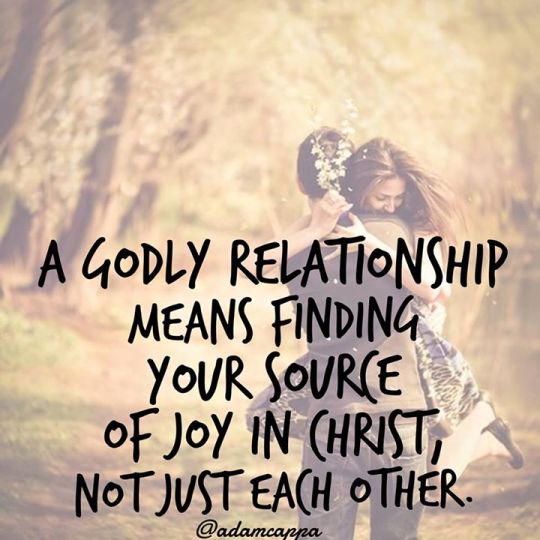
If you're like a lot of males, you probably do not make adequate eye contact with females when you're attempting to create fascination. Basically, when you're talking with her, you require to be staring her in her eyes. You cultivate that subdued body movement and you're going to see seduction skyrocket.
A great deal of males neglect their sides when it comes to body movement. What we suggest by this? We mean that many males deal with women dead on when they're talking to them. Rather, you desire to come close to from the side. Once you begin speaking, transform toward her when you chat. Turn away yet lean in when it's her turn to talk. This easy body movement hack can help you go leaps and bounds towards creating more tourist attraction with ladies.
In less complex terms, he acts like a typical disappointed ... someone who's not happy in his very own skin and is anxious by the company of stunning women.
Gestures and also non-verbal signs are really crucial when targeting ladies.
If you get any of these wrong, despite how well thought of your pick-up lines and also scripts are, you won't pick up a woman. Get these the right way and you don't need to drop out sophisticated openers, techniques, and also all that canned material.
Unbelievable! You may also draw in females by just getting around them if you grasp the correct and skilled body gestures really good!
The poor news is, it can take an entire week program to understand this fine art. However right here's fortunately, here are some pointers that will certainly get you up and running in the ideal direction and also different you from most of the goofy guys around:
Smile: Make the females you speak with feel comfortable as well as comfortable. Don't be the weird guy who swipes glimpses and looks away as quickly as she notices. Rather, be happy! Be that cheerful and wonderful-loving person that everybody wishes to be with.
The best smile is one that is amazing and authentic.
Even a difficult woman who presents you a "Dead Eye" can be melted with a well-delivered smile. At the beginning, your smile may look corny and phony. You don't need that.
Practice smiling in the mirror, be mindful of the manner you giggle. Once you get the smile that is ideal, practice by smiling randomly at individuals, your coworkers, the girl who works at the lunchroom, salesladies at the shopping center, it doesn't have to be a beautiful woman.
Execute all of these workouts right and you are really good to go!
tener un vistazo a este sitio Eye Contact: Where exactly do you see when you are speaking with females? For many men, it goes to her chest. It's a proven way to be ignored as somebody that salivates over her just like the rest of the individuals she seen.
Matter of fact, you ought to use every one of your powers not to consider her chest. That will make her wonder why her great gift is not operating at you.
So, where will you placed your eyes on during the conversation? On your girl's eyes! Determine and preserve eye contact, not since it's daunting but due to the fact that it is the toughest and most certain thing to do.
Now that is not to claim you should gaze at her like a weird man. Holding eye-to-eye contact for 60 to70% of the time needs to be pleasant, even enjoyable for most ladies.
Maintain the shoulders kicked back as if you've just completed a massage therapy. Raising your shoulders gives the perception that you're tense and anxious. If you feel your shoulders approaching towards your ears, attempt this step typically implemented in yoga exercise: shrug your shoulders, then push your shoulders back (as if your shoulder blades may touch), and afterwards push them down as well as away from your head. Not just does it let go the muscular tissue stiffness, it additionally enhances your stance 100%.
Your tone of voice needs to have a calmness, soothing yet dominating effect. You want a modest volume, don't talk too rapid or blurt out words, and also maintaining a consistent rate reveals you're not examining your ideas prior to they go out of your mouth, simply because you are sure in what you have to talk about. Prevent screaming or straining your voice, which implies if there's chance, recommend to continue the conversation from the high volume clubhouse to the silent side table.
Integrate your laugh, strong eye-to-eye contact, and upright stance (relaxing and standing), and you could be far better than the remainder of the guys that know nothing far better than to bend down at the view of her beauty.
The very best justification to examine women body language is to: stay clear of social rejection. Guys frequently suffer getting blown off and also usually criticize themselves for not approaching a female the right way or for acting as well ahead or for not being assertive sufficient. Some of these points might hold true yet remember that coming close to a woman at an event or celebration is just half the battle. You have to recognize from the beginning whether you will get denied or not.
Spare yourselfthe misery of the mystery and also examine her body gestures before even talking to her.
Is she really all set to connect with people or is the lovely lady waiting for a partner to show up? Did she come alone to the event or is she scanning the crowd for a person to go out with?
Perhaps if she is waiting for a friend or relative, you will see her looking at her watch or telephone.
If you really wish to confirm that, go up to her as well as participate in some warm small talk.
There's no danger here, she will respect your enthusiasm and the two of you might appreciate a polite talk.
0 notes